Explaining China with the benefit of hindsight and research into the paradoxes and complexities we observed during our recent visit.
This post contains affiliate links and/or references to our advertisers. We may receive compensation when you click on or make a purchase using these links.
A friend messaged us the other day with a question. She’d been invited to a conference in China and wondered if she should go. “I know you didn’t like China when you were there,” came the text, “and it’s never been at the top of my list for a variety of reasons. But I have this invite. What would you do?” In response, we found ourselves in the position of explaining China.
It’s not that we didn’t like China. We did like many things about China. We LOVED Shanghai, which might be the most beautiful city we’ve ever seen, particularly at night.
We loved that there seemed to be eighty gazillion kinds of mushrooms at the fresh market.

Ningbo Fresh Market
We liked that many of the people we met didn’t hesitate to speak their mind about subjects that we inferred may have been taboo not so long ago. We loved the traditions surrounding the Lunar New Year festivities, which we were fortunate to spend in both Ningbo and Shanghai.
1 of 3 New Series: Shanghai streetscapes. #shanghai #shanghailife #shanghaiist #shanghaifashionstore A photo posted by PassingThru (@passingthrucom) on
But the truth is, even though we spent six weeks there earlier this year, explaining China is challenging. The best we can offer is our own experience, and validate the similarities we see in the experiences of others who have visited. And even those experiences vary, as you must expect in a country so vast.
Other travelers have certainly taken their best shot at explaining China. One of the most helpful and succinct summaries might be an e-book from our friend, travel writer Stephen Henson. You can get it by subscribing to his quarterly newsletter at Journeys with Stephen.
Stephen, whose background is with Kelley Blue Book, began working in the Chinese automotive internet space in 2005. After ten years of traveling back and forth from the U.S. to China, he began to host tours for Americans in China, and now manages trips for mainland Chinese guests to the United States and Europe.
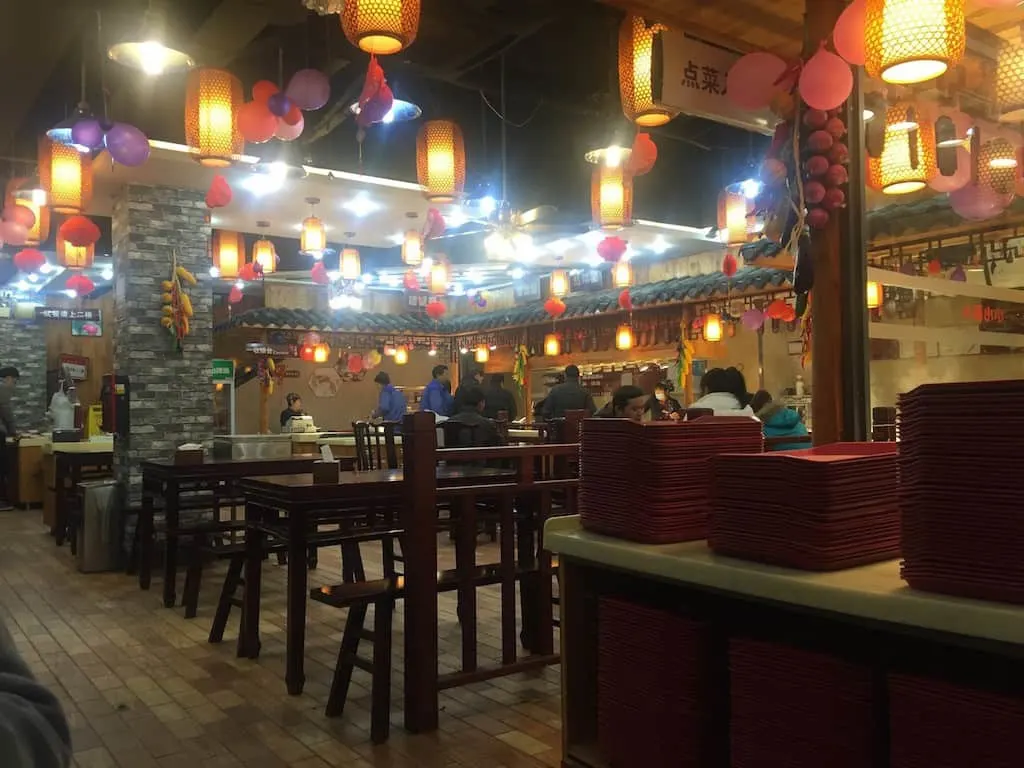
One of the cafeteria-style restaurants in our neighborhood. Just left of center by the column is the large silver container full of rice where you could refill.
Stephen does a great job of explaining China, which can be confusing and even maddening to the Western visitor, with grace and humor. Modern China co-exists within the auspices of a traditional culture arising out of the longest continuous civilization – 3,500 years of written history – of any country in the world.
Over 3 million Americans will visit China in 2016, and we can only expect the number to grow with easements in the Chinese visa process. We were granted a 10-year, multiple entry visa, for example. You can bet we’ll be back; the Chinese government certainly appears to be betting the same.
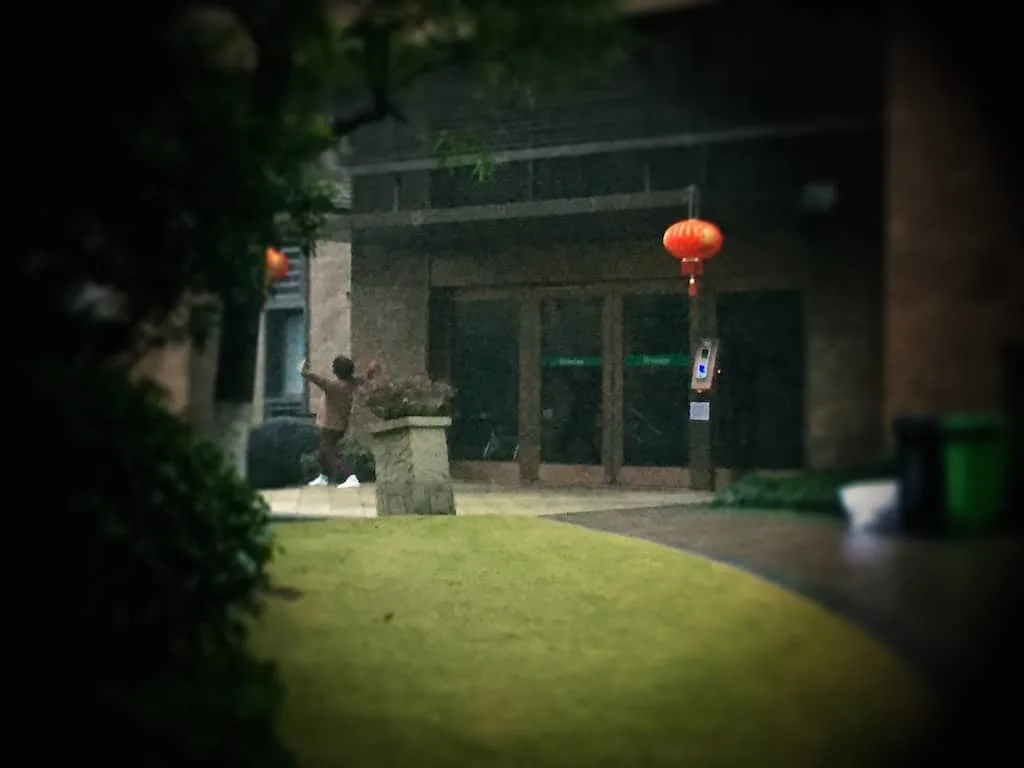
Solitary tai chi with a traditional sword in our Ningbo apartment complex – I felt like such a voyeur taking this photo.
But explaining China, even after an intermediate period of time spent there, is challenging. We felt as though we learned a lot, yet very little at all – always the biggest clue that we require more context. As with other destinations, we needed to let the experience simmer a bit while we did more homework.
Zooming out helps us make sense of things after the fact, and keeps us from being distracted as they’re happening. And we certainly don’t claim to know all about China. How pretentious would that be? Suffice to say we’re going to tell you what we saw and felt and then try and put it into perspective with stuff from other people who are in a better position to know.
China is both ancient and young – it has 5000 years of history yet its real integration into the world is only about 30 years. China is both rich and poor, being the world’s second largest economy but its global ranking of per capita GDP is only around 80 with 70 million people still living in poverty. China urgently needs reform but must be cautious at the same time.” – Consul General Jin Zhijian’s “China’s Place in the World” speech, at the U3A Course, Dunedin, March 2016
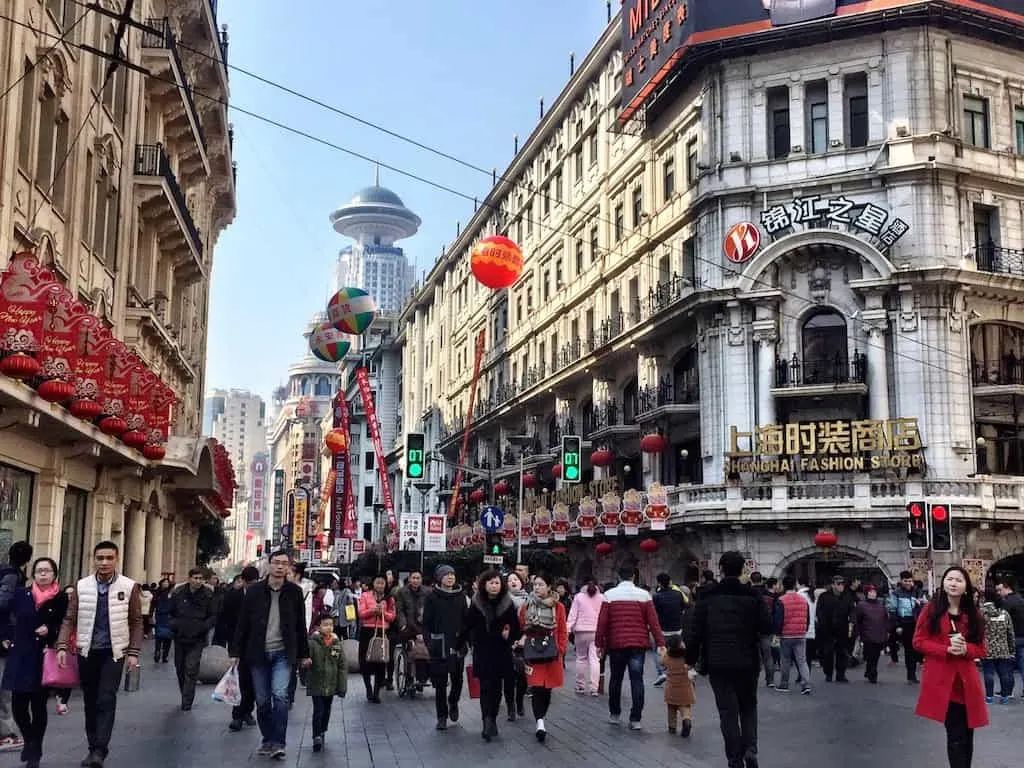
Contrasting architecture in Shanghai Central Business District on a “blue sky” New Year’s Day
The most significant impressions (and resulting conclusions) from our stay in China can be grouped under broad, interdependent headings: Economics, Personhood, Environment, and International. Here goes!
Explaining China in terms of Economics
At first, explaining China in terms of economics seems like it would be easy. China is booming.
Since initiating market reforms in 1978, China has shifted from a centrally-planned to a market-based economy and has experienced rapid economic and social development. GDP growth has averaged nearly 10 percent a year – the fastest sustained expansion by a major economy in history – and has lifted more than 800 million people out of poverty.” – World Bank China Overview
Infrastructure – airports, train stations, highways, bridges and city streets – was new or in the process of being improved.
3 of 3 in the Series: The Ningbo train station or the Starship Enterprise? #ningbo #ningbochina #chinalife #traintravel A photo posted by PassingThru (@passingthrucom) on
We saw building cranes everywhere, looming like velociraptors over skyscrapers lined up like dominos.
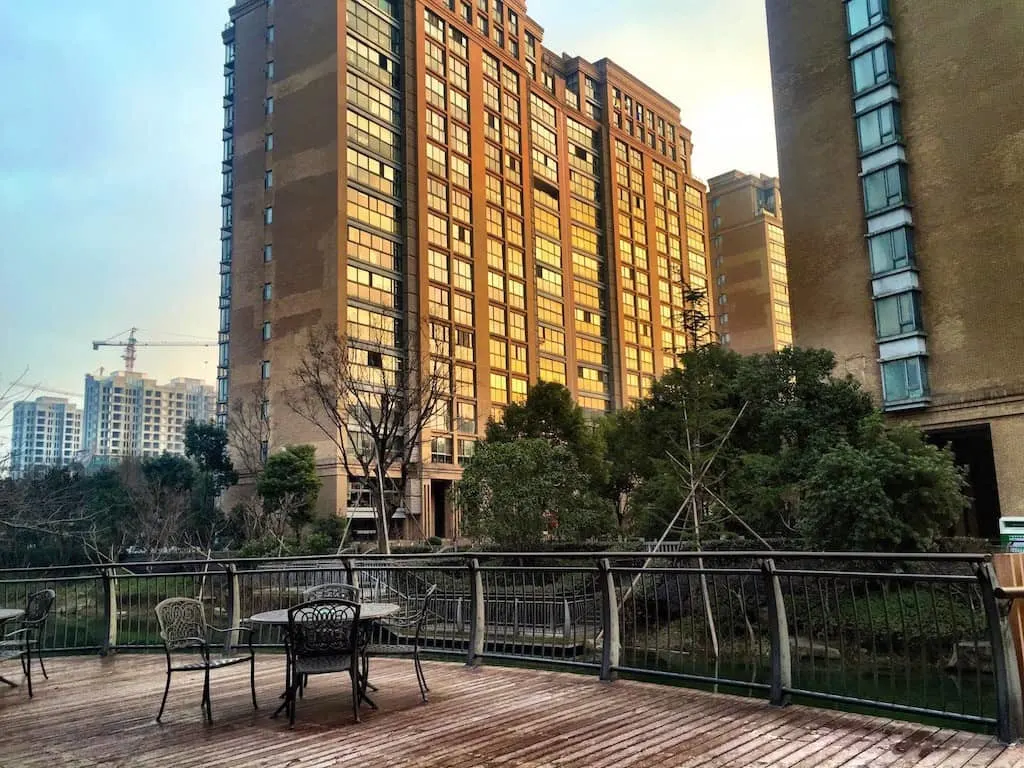
Construction cranes hover over buildings lined up like dominos
Walking the dogs around the residential compound where we were house sitting was accompanied by an orchestra of engines and the clanging and banging of construction. It was post-apocalyptic surround sound, made more ominous because the sources were obscured in the polluted half-light, seemingly kept from encroaching upon our apartment complex only by an imposing system of fences and guard shacks.
We were foreign birds in an elite cage where expats and wealthier Chinese people resided.
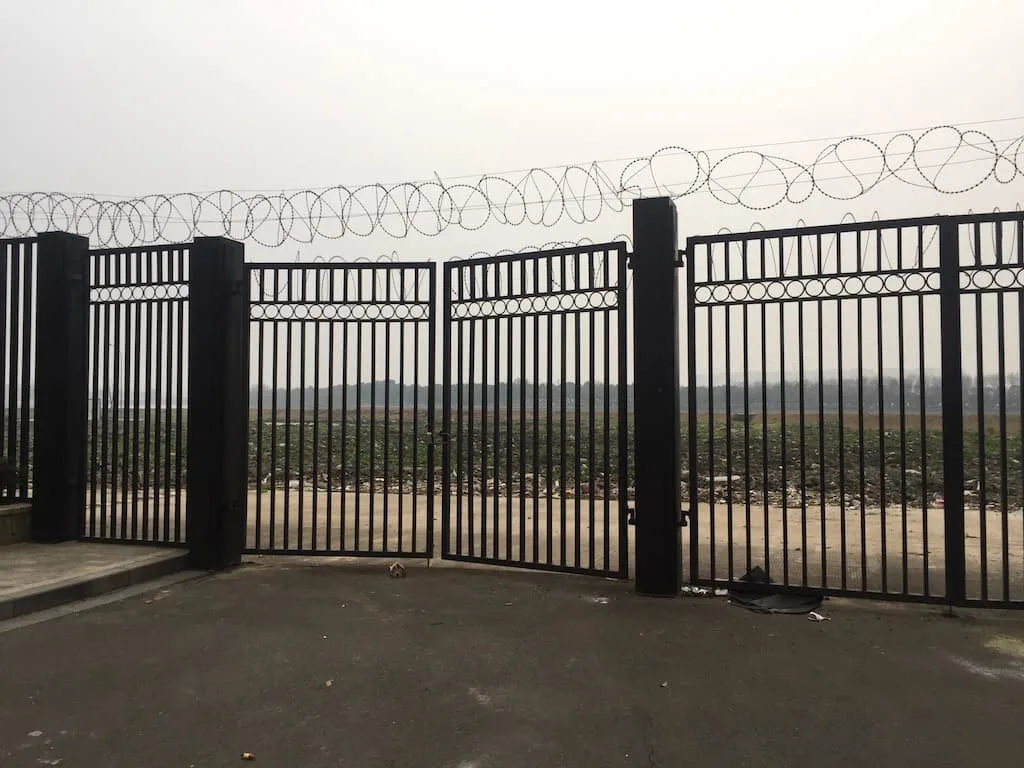
Perimeter fence – replete with razor wire – of our apartment compound with the river beyond.
A closer look beyond the fence revealed that many, if not most, of our neighbor buildings were empty. In the early evening, we heard the howls of street dogs whose packs had taken up residence in them. On one occasion, two menacing dogs with bared fangs actually rushed the fence which separated me (and the dog I was walking) from them.
A photo posted by PassingThru (@passingthrucom) on
Our buildings and these ghostly neighbors were built on low ground with several hundred yards of construction debris and garbage (not yet a landfill of any sort) between us and the river bank. This was a very unappetizing sight from the apartment windows.
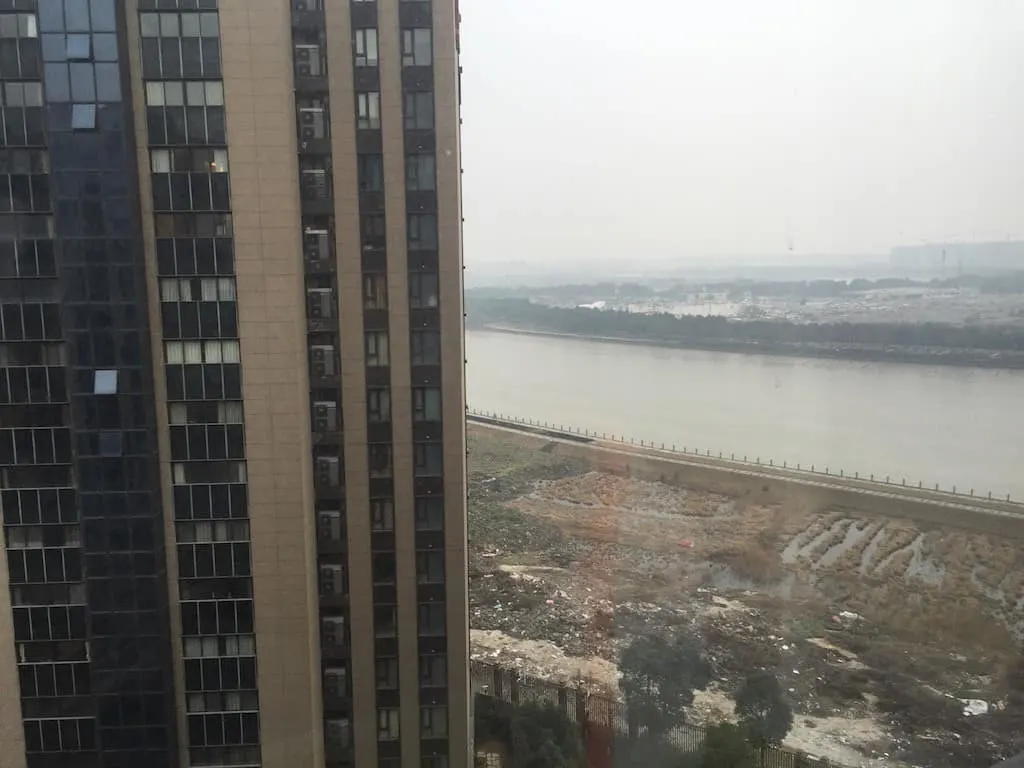
Hazy view from Ningbo apartment
The effects of ground instability and inadequate construction methods were everywhere: sidewalks and foundations cracked and heaved, water seeped and even gushed during heavy rain in the basements where residents’ e-bikes and vehicles were parked, steps were uneven and hazardous.
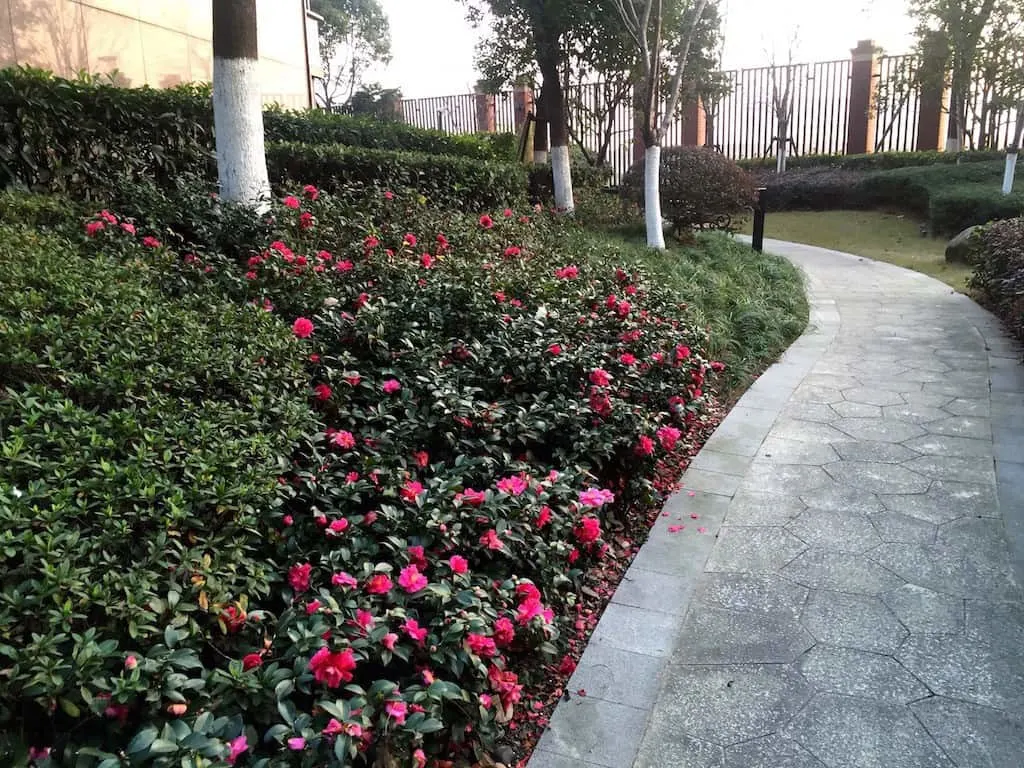
Walking path through Ningbo apartment compound. Roses bloomed in January! Tree trunks are painted with a pest repellent.
Out our kitchen window, behind some sort of large depot building which fronted a paved throughway, was a small, older residential complex of two story housing closer to the river. This was an island rising out of standing water on low ground, reached by foot or e-bike via a muddy path.
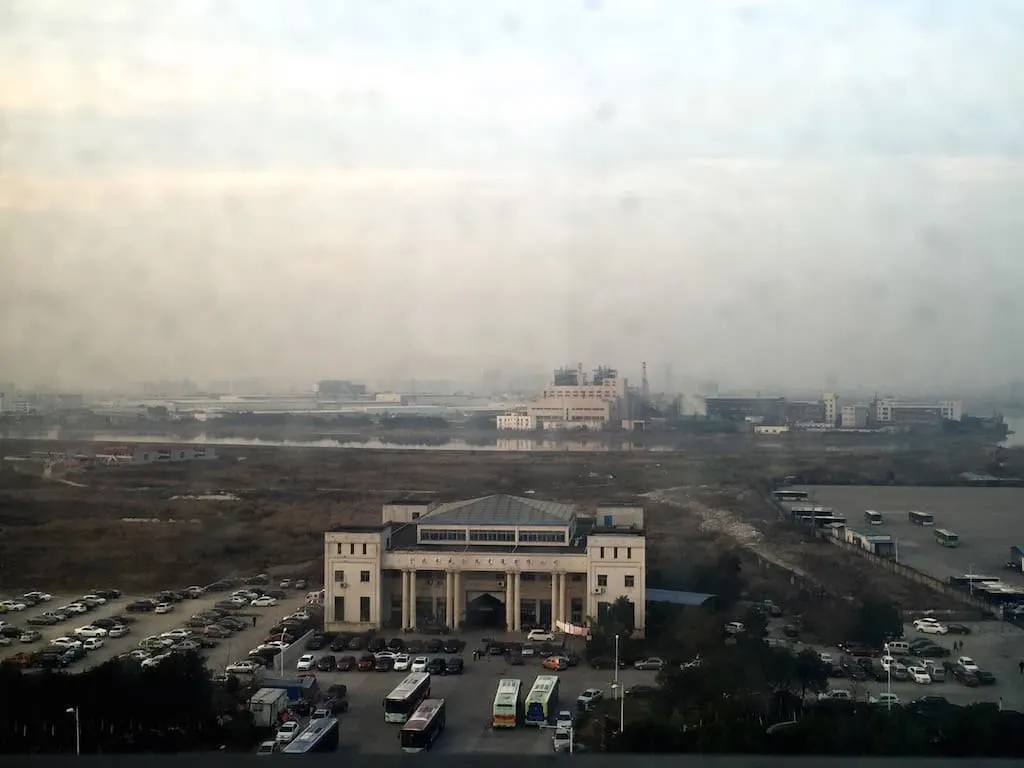
Kitchen window view. Older low rise residences to the left of the depot on this side of the river.
On our thrice-daily walks with the dogs, we had time to ponder. What were these ghost complexes of thousands of empty apartments doing just sitting there? And why, if these were empty, were others going up all over town?
The answer lies in long term – 20 years or more – planning for urbanization. China’s fiscal policy forces local communities to expand, using property sales in order to remain solvent. They annex adjacent land, rezone it, and then sell to developers. Profits are enormous: over $438 billion in 2012. (See more: Enough Empty Floor Space to Cover Madrid).
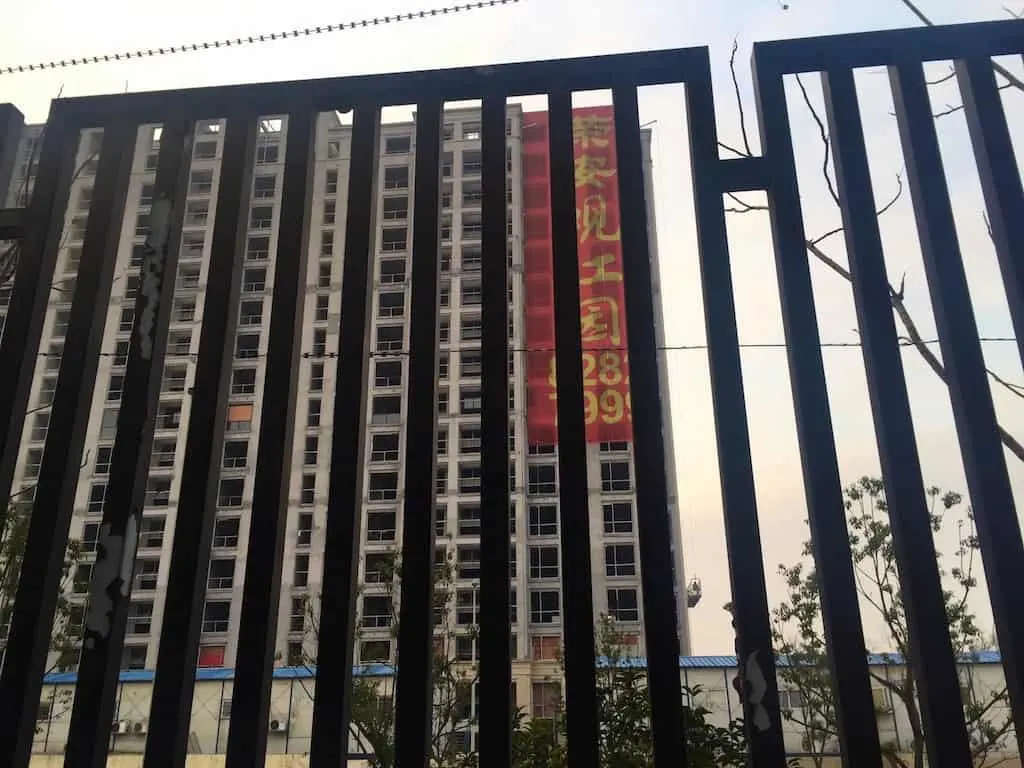
Forbidding symmetry mimicked in the ghost building next door
China expects 250 million of its rural citizens to migrate to cities within the next few years. The government intends to encourage them via a National New-type Urbanization Plan (2014-2020). The plan is described as a “staggeringly complex vision involving the mass uprooting of Chinese citizens and the destruction, and reconstruction, of homes, office buildings, and infrastructure.”
There’s an even darker side to this engineered population shift: displaced people throughout China are accusing local officials of seizing their land without properly compensating them to sell to developers. Farmers aren’t the only ones whose lives are being uprooted due to government intervention. In February of this year, China announced that almost 2 million coal and steel workers will be removed from their jobs, most likely moving to service sector positions. Services recently rose to over 50% of the Chinese Gross Domestic Product.
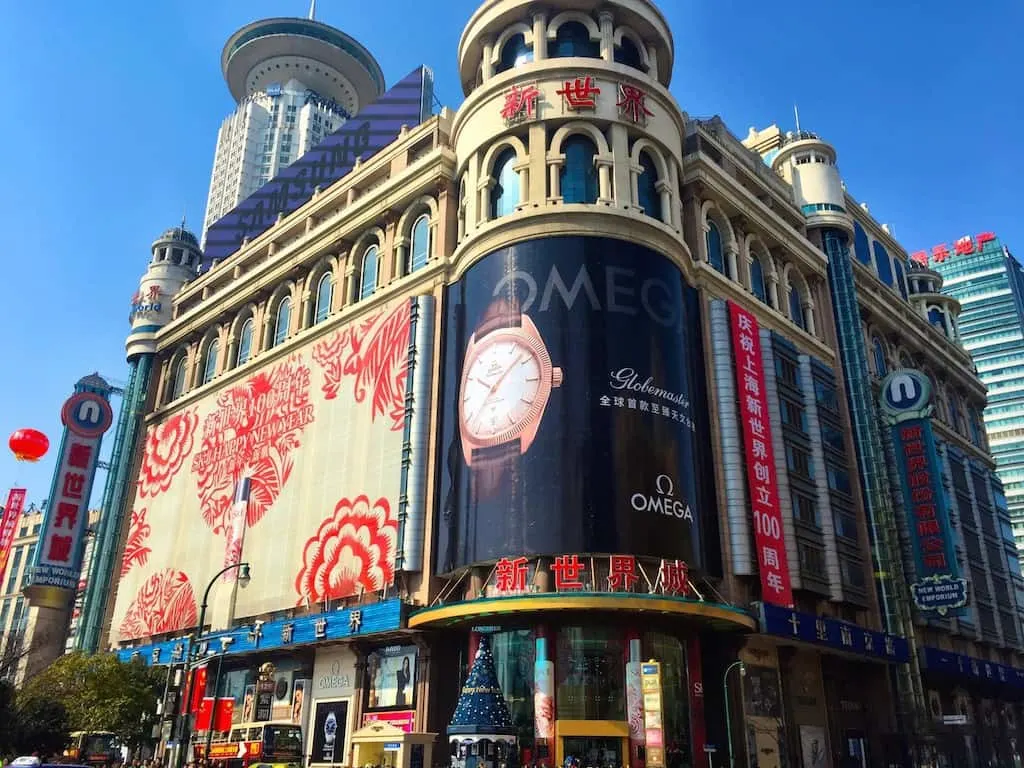
High end shopping in downtown Shanghai
Transitioning people from a rural world to an urban environment will balloon the Chinese middle class. This is intentional. The government wants these new consumers to replace international demand for goods and services, fueling the domestic economy from within.
Right now, they’re inflating the housing bubble. It’s not uncommon in China to purchase an apartment with no intention of living in it, for future needs. Is this an adaptation people are making because of the lag in the building infrastructure equation, or is it more of a cultural attribute? We think a little of both.
It’s not just a residential real estate bubble, though. It’s a commercial space bubble as well. Now China may be tasked with repurposing buildings which were originally designed for business. We saw evidence that this might have occurred in our neighborhood – a children’s school was on a corner which looked as if it might have been intended for retail when initially built.
Another example in Soyoo, called the Joyful Growth Center, is a playground and kindergarten which had been unoccupied since its masterplanned business center origins in the early 2000s.
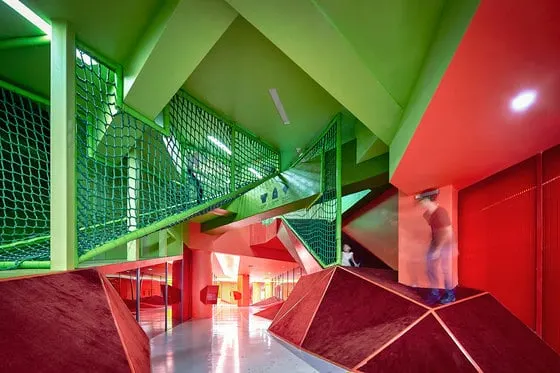
Repurposed business space is now a kindergarten. Photo Credit: Architonic
Consumerism was well on display where we were in Ningbo and, as you’d certainly expect, Shanghai. Western brands and lookalikes (sometimes in unintentionally hilarious renditions) were everywhere. There were Audis, Mercedes and BMWs (and Kias and Chevrolets, too). People were smartly as well as traditionally dressed.
City people will drive economics:
In theory, new urbanites mean vast new opportunities for construction companies, public transportation, utilities and appliance makers, and a break from the cycle of farmers consuming only what they produce.”
Explaining China in terms of Personhood
The sheer numbers of people make explaining China in terms of personhood, or the value of an individual, challenging from a Western perspective. Competition for space leads to behaviors we think of as rude: pushing and shoving instead of lining up in an orderly fashion, for example. People will touch you: you might feel a hand at the small of your back or on your arm “encouraging” you to move.
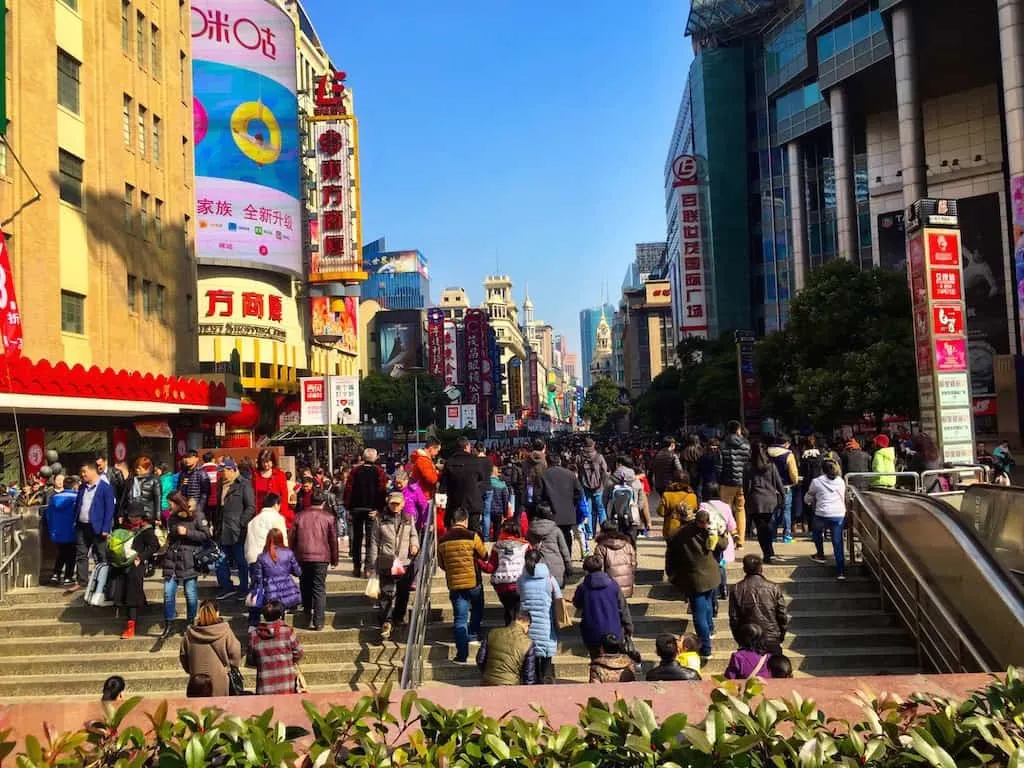
Shanghai shoppers emerge from the subway to promenade on a “blue sky” New Year’s Day
Service people will literally “get in your face,” shouting at you to choose them when you enter a store, accosting you in an intimidating gauntlet as you disembark from a train. Nobody seems to have received the Western memo that this kind of behavior doesn’t foster good long-term relationships.
Maybe it just doesn’t matter to a store clerk or a private taxi man. They’re only going to be in your presence for a short period of time, after all, and there will be a gazillion customers after you.
In the past 2000 years, Confucianism has been accepted by almost every dynasty in Chinese history, and has integrated deeply into all aspects of life in the Chinese society. And it has become the most important philosophical system for Southeast Asian countries and Chinese people across the world. I would like to point out that benevolence, righteousness, propriety, wisdom and integrity are all requirements to one self, it can also be understood as a reflection of altruism. The late Singapore prime minister Lee Kuan Yew believed that the collectivism over the individualism is an integral part of the long and rich history of Confucianism. We are all closely intertwined and we are increasingly becoming a community of common destiny. This is an important concept in traditional Chinese culture and a powerful guarantee for China and the world to develop in a peaceful environment.” – Consul General Jin Zhijian’s “China’s Place in the World” speech, at the U3A Course, Dunedin, March 2016
In China, an underlying societal premise is that the individual is expected to defer his interests for the betterment of the group. Nowhere is this more evident than the restrictions the government places on access to information and social media on the internet.
One of the more prevalent official reasons for blocking Google and Facebook is that “terrorists in the Western provinces” will use these services to further their ends. It’s for the “safety of the people” that access is denied. This reasoning was conveyed seriously, yet in carefully neutral terms, when we questioned.
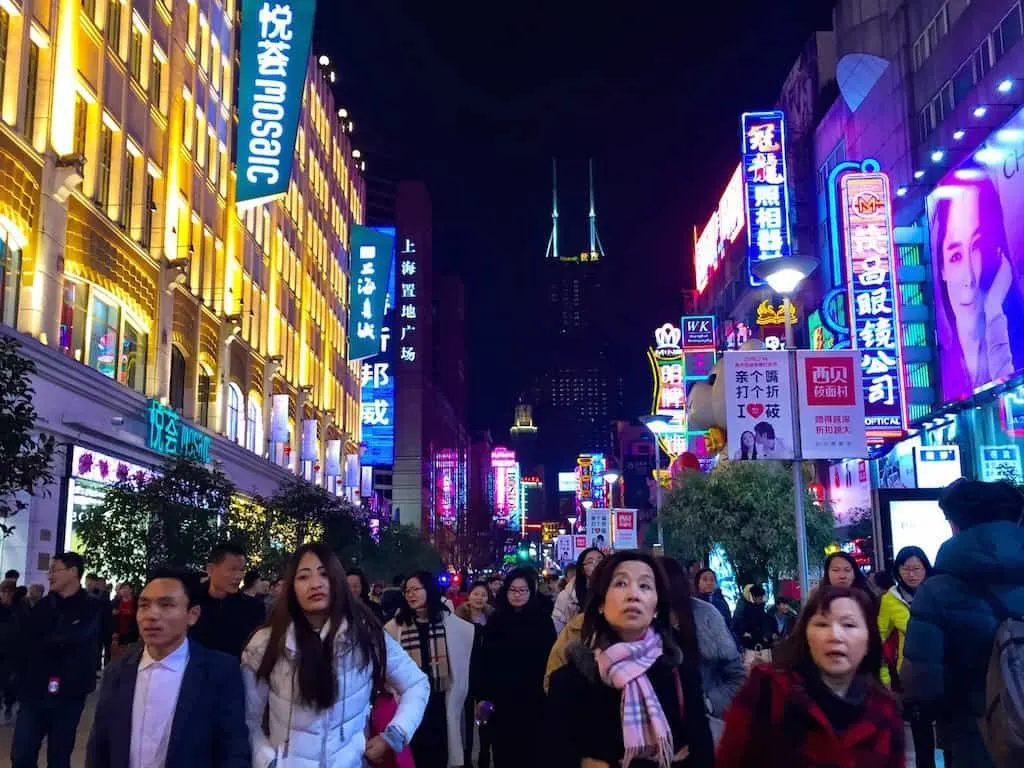
Strolling at night in Shanghai
According to the BBC’s John Sudworth, a recent media tour by President Xi Jinping has been “widely seen as confirmation of his desire to bring journalists to heel and stamp out what his government derides as dangerous ‘Western values’ such as freedom of expression.” Sudworth reminds us that on the one hand, while China had no fewer than 49 journalists behind bars in 2015, it attempts on the other hand to “correct wrongful thinking and anti-China sentiment of the foreign press.”
An instance of perhaps unintended double entendre critical of the party in the Chinese press earlier this year resulted in “dismissals, self-criticisms and demotions of journalists,” and an acknowledgement of a “serious mistake” by the Nanfang Media Group.
If recent response to a particularly severe instance of press fawning is any indication, a growing portion of the populace is openly skeptical when able to hide behind the anonymity of WeChat, China’s approved social media app.
Interestingly, Chinese state media uses Twitter (follow @XHNews), while the government blocks it from the citizenry. Students and academicians alike are hampered by Google-related restrictions, needlessly limiting curricula and creativity. In our case? We simply switched to Bing on our mobiles, and realized how much we had come to rely upon Google Maps when out and about in new places.
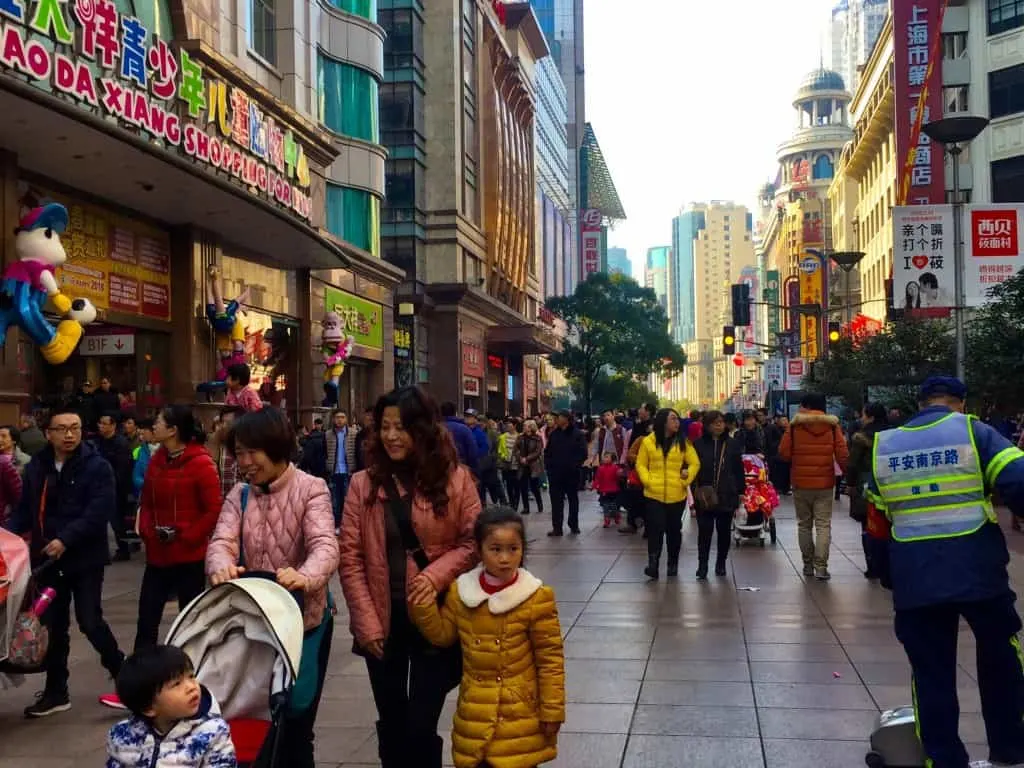
On the street in Shanghai
It’s hard to wrap your Western head around this landscape, even if your first inclination isn’t skepticism when government and “what’s best for everyone” appear in the same sentence. The practical reality for visitors to China? These restrictions can be easily circumvented in private with a VPN, which masks your IP address. You’ll want one to stay connected when you visit. (See our recommendation in the Tips and Practicalities section below.)
Paradoxically, in the family unit, hierarchy of individual importance can result in things as disparate as only child syndrome (in a country notorious for limiting births and the subsequent gender imbalance there are many “little Emperors”) to the veneration of elders.
Adult children are required by law to provide for and even regularly visit elderly parents. Many households are multi-generational. We’d routinely see babies and toddlers in a loving grandparent’s or extended family member’s care.
When you’re buying something, it may not be “yours” until you’ve paid for it; this means somebody might come along and examine or even take something you’ve put in your cart in a store, not even surreptitiously.
As Westerners, we were objects of curiosity. Entire tables of diners would turn around and look at us as we entered, ordered, and ate. We’d just smile back and wave. Even in more cosmopolitan Shanghai, people wanted their photos with us.
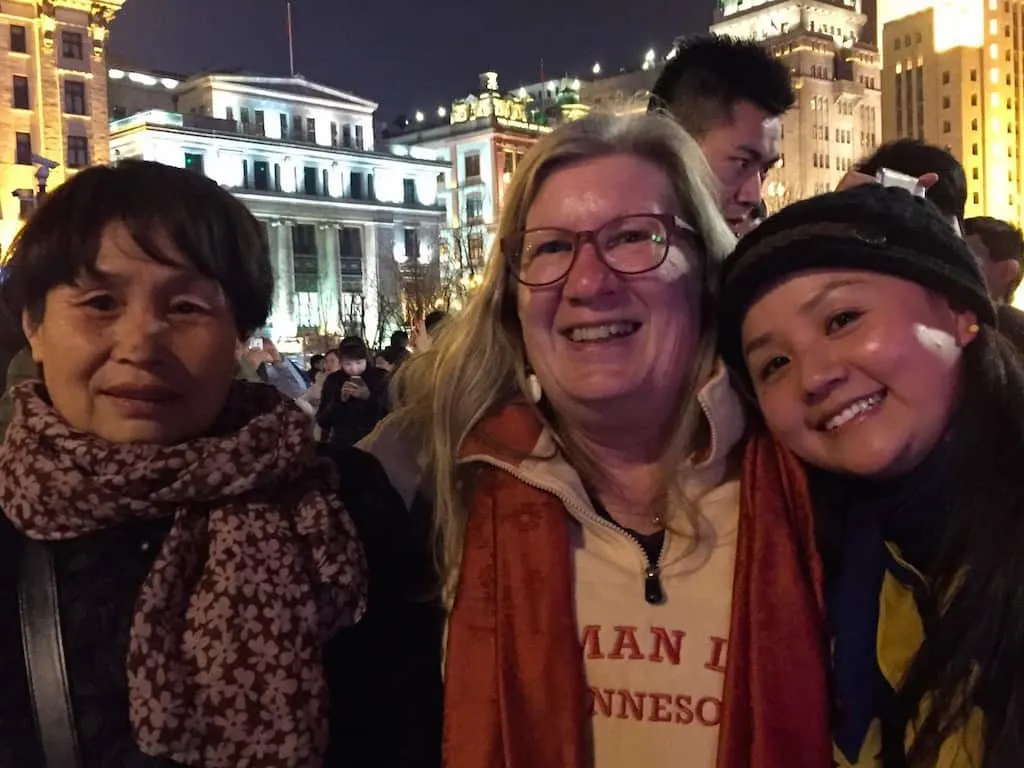
Complete strangers, yet friends, on Chinese New Year’s Day
“Rules, regulations, and conditions vary greatly throughout China, but a general rule of thumb is that traffic safety is poor and driving in China can be dangerous. Traffic can be chaotic and largely unregulated and the rate of accidents in China, including fatal accidents, is among the highest in the world. Motorcycle and bicycle accidents are frequent and often deadly. . . [Y]ou should show extreme caution when walking in traffic, even in marked crosswalks. Child safety seats are not widely available.” – U.S. State Department
The pedestrian has no right of way in Chinese traffic, even in a crosswalk. Cars would routinely turn in front of us against a traffic light, and they’d keep coming with the driver looking right at us as if daring us to stop them whether we were on foot or e-bike.
There’s been such deterioration in the Chinese social contract that the elderly can no longer count on their fellow citizens for help.” – Adam Minter, BloombergView
If you’re injured in a traffic accident, we were told you should not expect any assistance from passersby. (This one was hard for me: every time Pete left to go to the store on the e-bike I prayed for his safe return. How would I ever find him if a mishap occurred?)
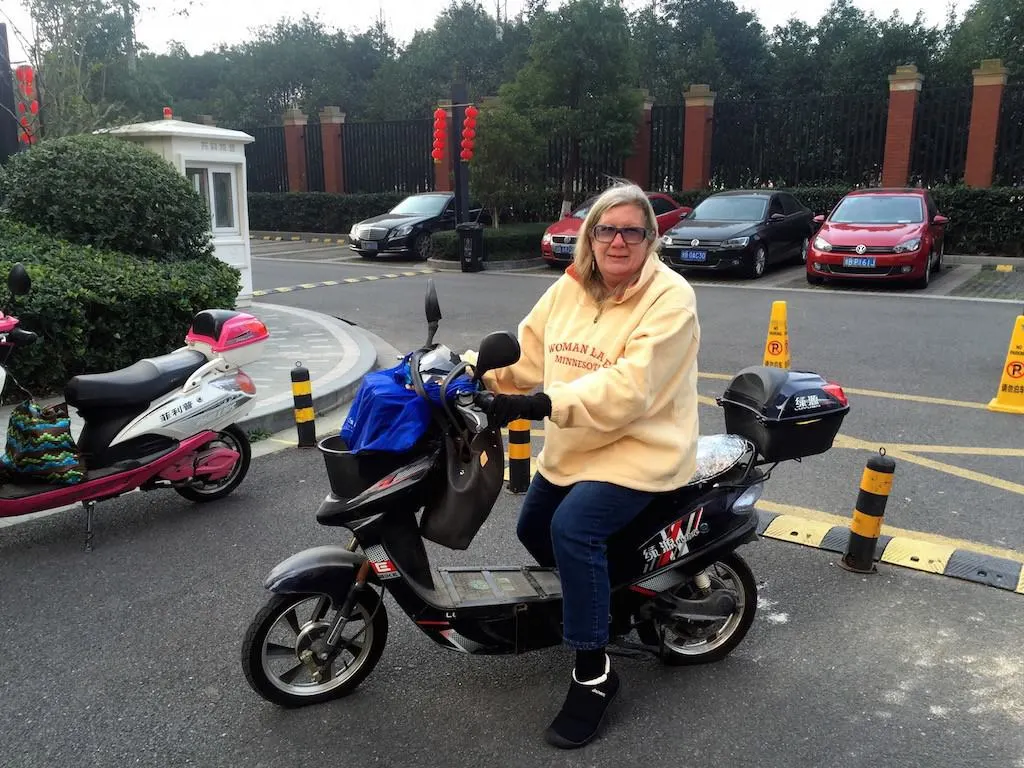
On the e-bike. Courage does not exist in the absence of fear. 🙂
Dogs were routinely off leash in public spaces, and owners allowed them to be aggressive with other dogs. We heard the story of a little neighborhood dog – off leash – getting run over by a luxury car. The driver shrugged off the pet owner’s objections by saying, “Just get another one.”
When our homeowner challenged a neighbor whose dog had attacked his, he was told he should just go back to his own country. Walking the dogs at certain times of the day felt like guerrilla recon – we learned optimum times when we’d encounter fewer canines and their owners.

George and Jacky – the sweet Chinese rescue dogs we cared for in Ningbo. Note the GPS on their collars.
All of this, along with the language barrier, left us feeling rather isolated. When there was a breakthrough due to pleasant interactions with others, we were charmed. There was the young man who assisted us in a restaurant by translating a written service survey.
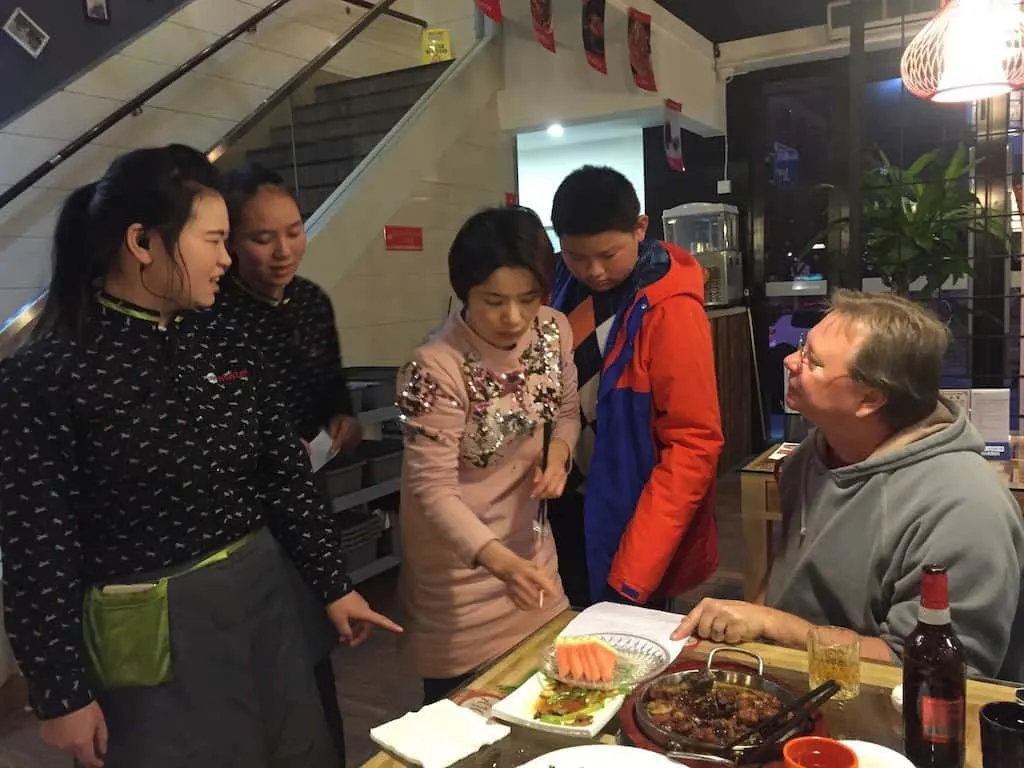
Young man and his mother help us translate a written restaurant survey
There was the friend of our homeowners who graciously met us at the train station and showed us around town, lending us an extra e-bike so we didn’t have to ride tandem. There was the restaurant owner who saw me struggling with metal chopsticks and beckoned his server for a fork. There was the bartender who quizzed us about Hawaii and was very forthcoming about modern life in Shanghai.
“China is one of the safest countries in the world for female travelers, solo travelers and families.” – CNN, China Travel Tips
This may very well be true. Being of a certain age, which makes us early to bed and early to rise, we never found ourselves in any shady situations. We contracted with a driver at the Shanghai train station to take us into town after a dearth of taxis promised to strand us on the Lunar New Year’s Eve. He had his daughter with him; we took this as a promising sign. And sure enough, all was well.
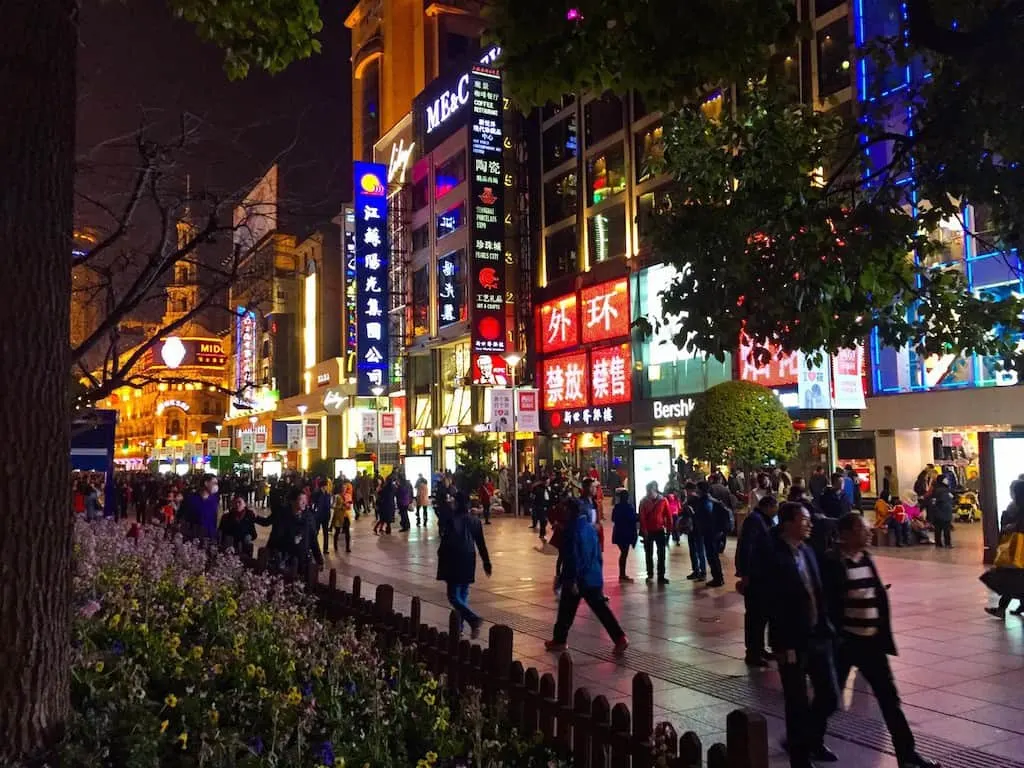
Vibrant Shanghai at night
Traditional residential alleys didn’t really seem forbidding, either.
Ironically, the only ominous energy we experienced was at night in our secure residential compound. Poorly lit pathways and dim streets, plus the fact that everyone seemed to dress in dark colors, made for startling encounters at times. If you’re used to more brightly lit environs at night, you might feel similarly vulnerable, but it’s no reflection on your relative safety.
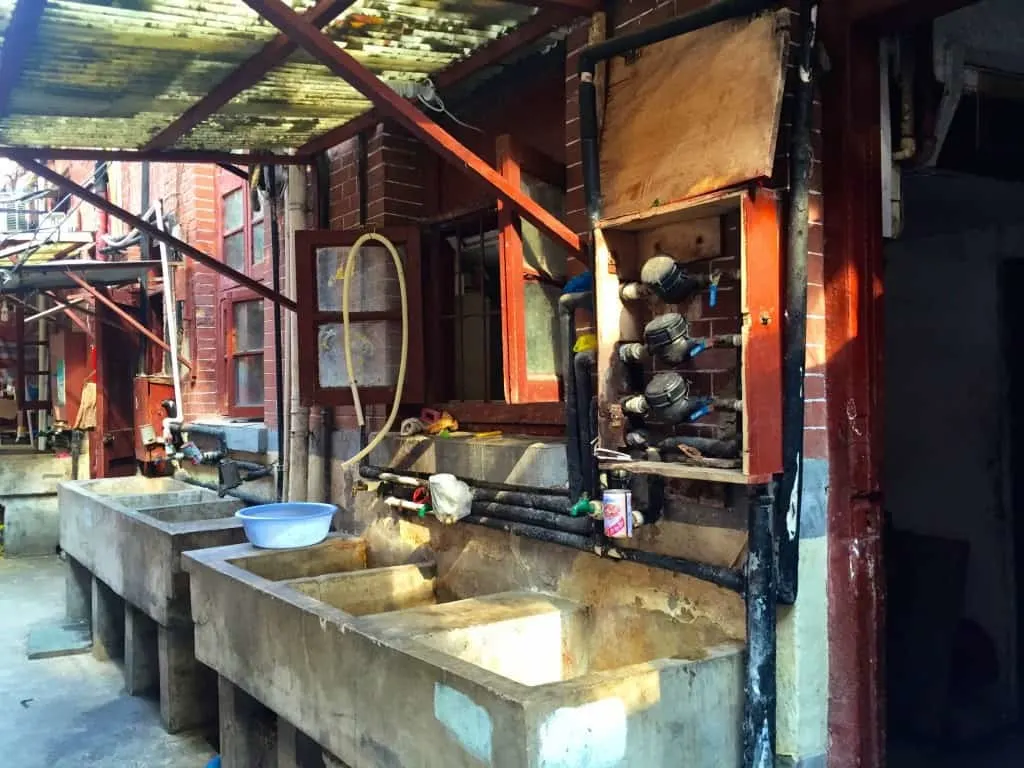
A back alley in Shanghai. Stone sinks for washing up.
Explaining China in terms of Environment
While there is currently plenty of room for the government-induced rural migration to occur, there may simultaneously be an interim period during which municipal supports and services will be insufficient or even non-existent. And expectations might best remain low: In the luxury apartment where we were housesitting, the bathtub taps were just for show; you filled it with the adjacent hand held shower head.
Winter winds whistled through window gaps and required we reset the water heater numerous times; the inside temperature in the kitchen was a good 5 degrees centigrade cooler on the coldest days. While its faucet levers both turned, there was no hot water whatsoever in the master bathroom sink.
- Loved this faucet!
- Lovely modern kitchen
These details may be less concerning to someone coming from a rural environment where farm and village housing is vastly different. What mattered more to us was that we couldn’t brush our teeth using water from the tap. Bottled water for drinking, boiled water for cooking and washing vegetables, and tap water for showering and laundry was the rule of thumb. The homeowners we house-sat for wouldn’t even let their dogs drink tap water.
Running out to the store for more water was a regular thing, and the store didn’t always have it, so then you’d have to make do with smaller bottles, or a suspect brand. We were warned that empty bottles are often refilled with tap water and then re-sold, so we only shopped in certain stores and bought certain brands.
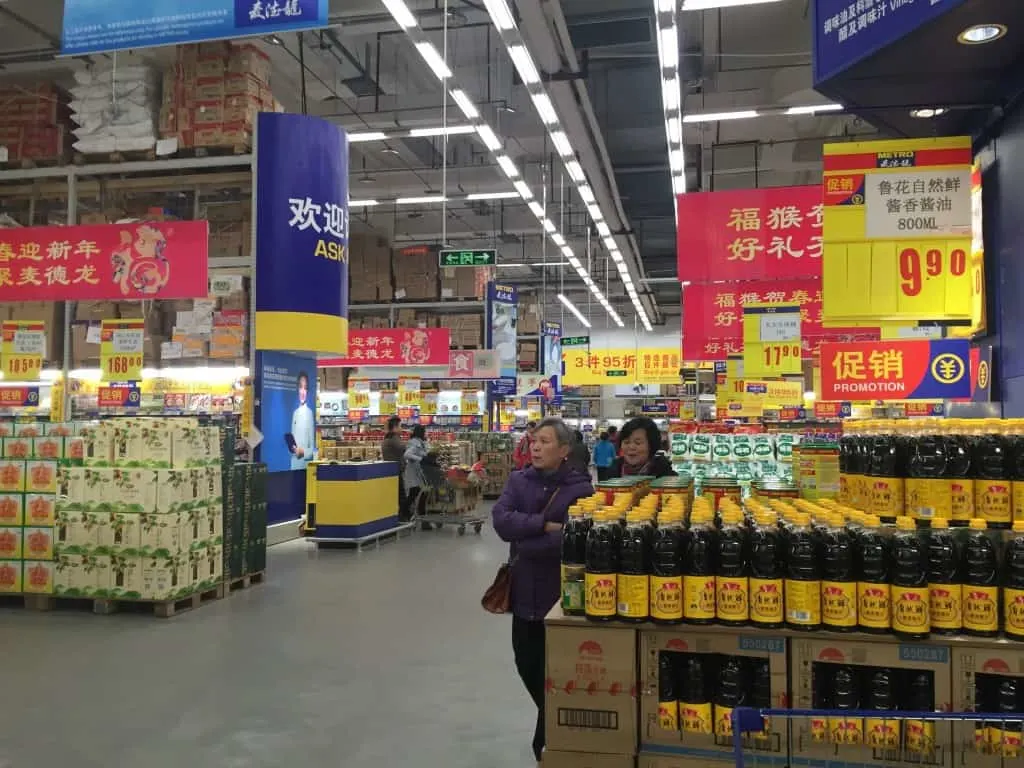
Big box warehouse shopping in Ningbo
Procuring food was a similar story. “Safe” food could be found only in certain stores. We avoided processed foods entirely, with the exception of recognizable western brands. We were advised where to purchase meat and where not to.
Meat and fish is often sold on street corners in China; this was the case in our high-end expat neighborhood. We didn’t really want to eat fish or shellfish which might have come from the river we could see out our window, what with the belching smokestacks of a factory on its shore obscuring our view. We could only imagine what was being spewed into the water.
- A familiar face
- We called this “sexy pole-dancing chicken”
Eating in restaurants required additional savvy. Make sure beer and wine is delivered to your table unopened, we were advised. We felt best going to cafeteria style restaurants where we could see what we’d be getting. There were some hilarious results when we couldn’t.

Oh. My. God. I ordered chicken. This must have been some sort of revenge, as it was served cold.
On the whole, it’s fair to say we were disappointed by the local cuisine in the region we visited. We did enjoy shopping at the fresh markets, and Pete got to be a favorite customer of several of the vendors there. He learned that these relationships were important. Often the best vegetables were kept out of sight, only for good customers.
Air quality in Ningbo was poor; we understand it is worse elsewhere. Upon arrival, we learned that the previous day had been one of “blue sky.” Evidently, it’s remarkable when the sky isn’t obscured by pollution. This was depressing. I felt as though my Seasonal Affective Disorder, long dormant in our years of following the sun around the world, had awakened. We counted “blue sky days” on one hand during our six-week stay.
. . .the government literally does not have the ability to keep its word. Regulatory apparatus is local not federal, estimates are falsified (air pollution), local laws against pollution are unenforced, pollution emanates from locally well-connected, job-creating state-owned enterprises.” – Comment attributed to a GMU economics professor
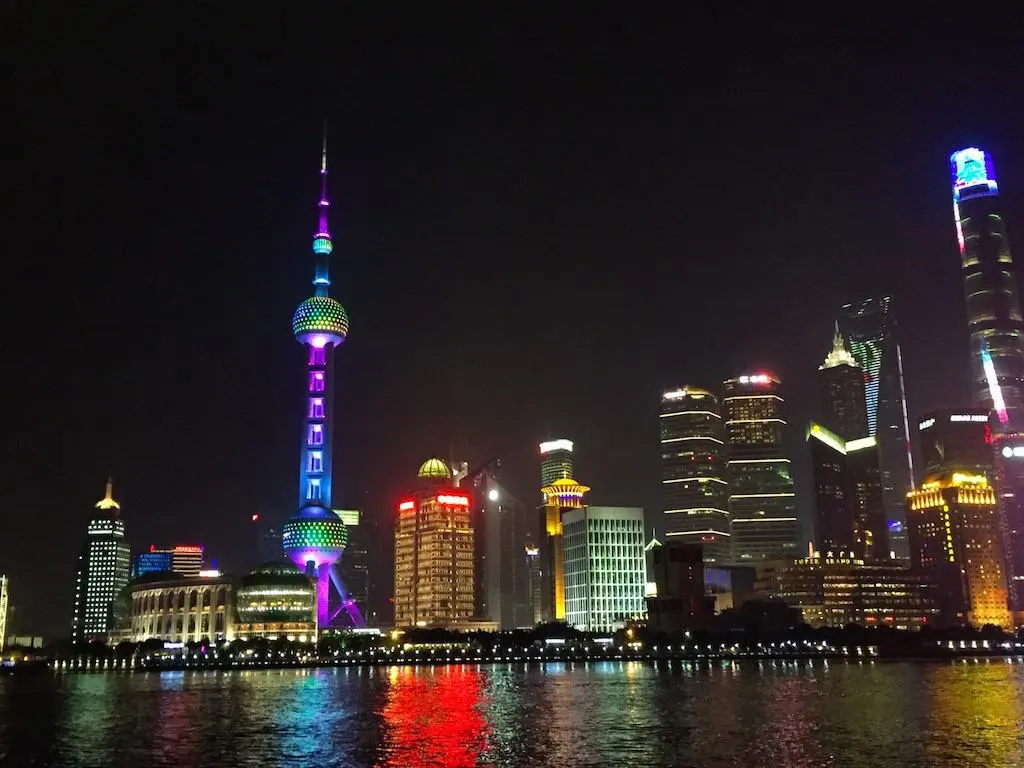
Shanghai – quite possibly the most beautiful city we’ve ever seen
China’s leaders give every indication of being broadly aware of the nature of the country’s problems and the kinds of solutions that are needed. What’s less clear is that they can actually deliver these solutions.” – Matthew Iglesias, Vox, China’s Economic Slowdown
During our stay, after an initial period of sickness we attributed to air travel, we began to suffer with headaches and respiratory issues. We didn’t put two and two together until I remembered living in Los Angeles when the Santa Ana winds would blow; we found ourselves similarly irritable.
Windows in the apartment remained shut; when opened, sooty dust would cover everything. Peering through a brownish film on the outside of the windows (were they ever washed?) deepened the haze.
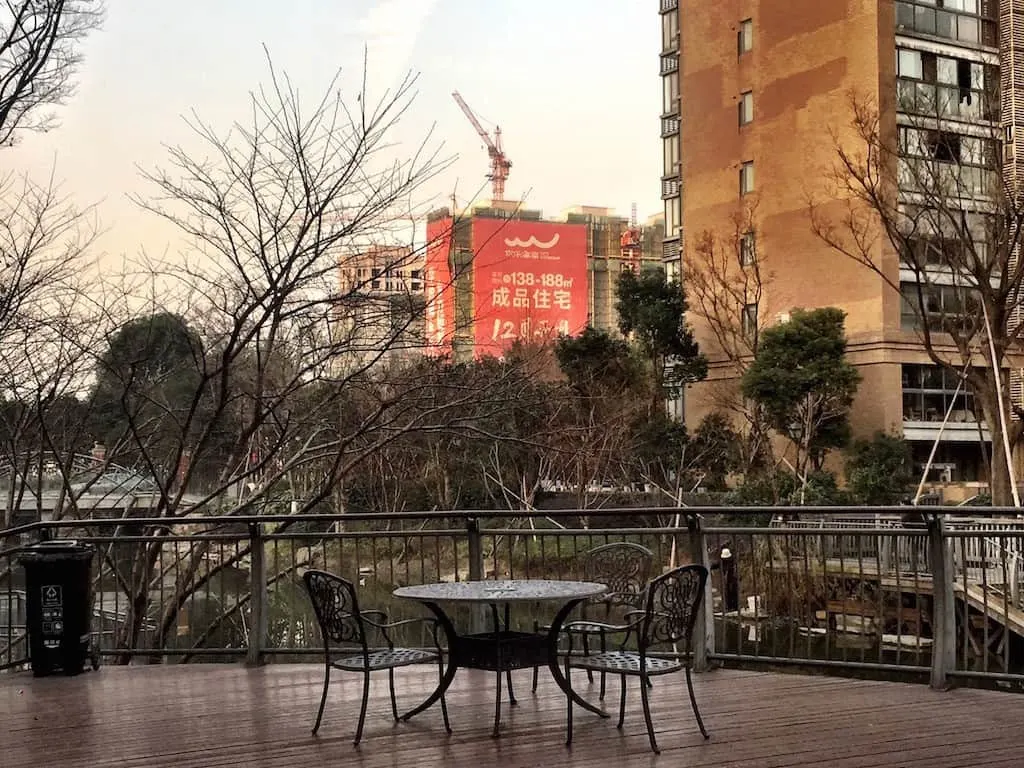
Hazy outlook in Ningbo
Later we learned environmental pollution is being publicly protested, but not without severe consequences: see these disturbing photos from an environmental protest in Shanghai in June of 2015. Observers believe the central government cannot solve environmental problems, so instead it is opting to manage social unrest by keeping it localized. But large protests have turned violent in at least half a dozen provinces throughout the country.
Public perception is increasingly skeptical of government safety assurances, and local officials are suspected to prioritize economic growth for the financial incentives they receive.
We are the generation at the point when China has become more open. We travel internationally, and we see the outside world through the Internet. We’ve been influenced by other countries’ environmentally friendly ideas. And we want to tell the world what we want, what we think and what the government has been doing wrong.” – Wildlife photographer Yuanqi Wu, in China’s Generation Green
Our neighbors routinely dried their clothes by hanging them out the window; it seemed to me this practice would dirty them all over again. Our homeowners had air purifying machines going 24/7 in every room of the apartment. Changing the filter after only a brief period of time was a shock. It was black with large soot particles.
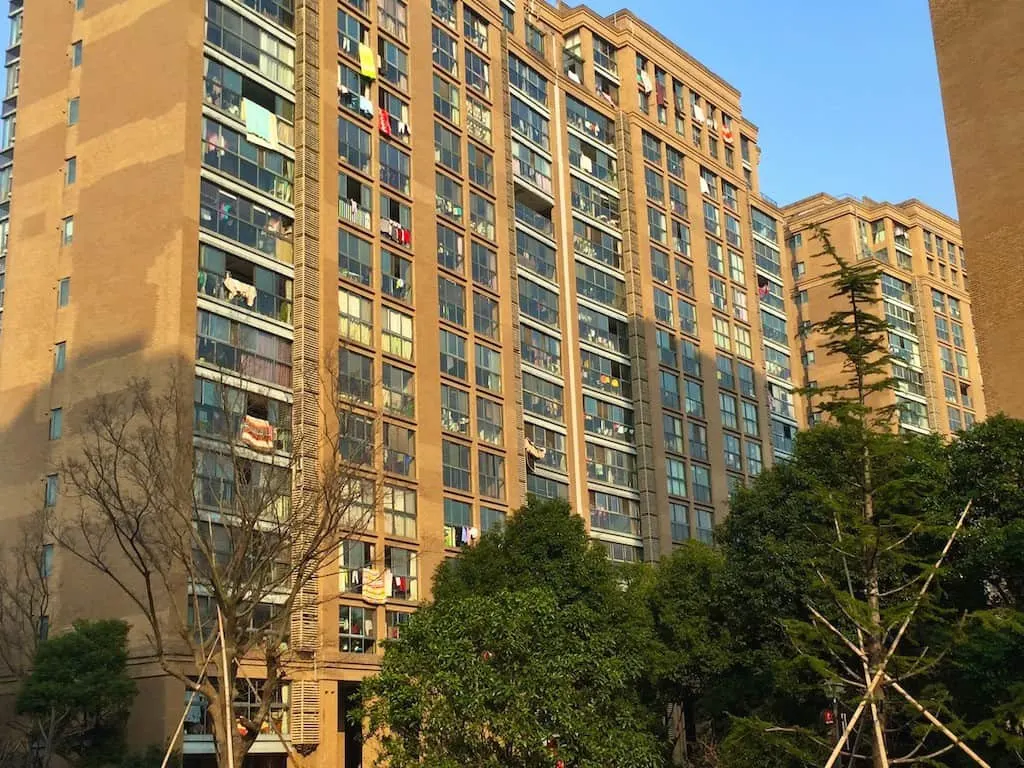
Laundry hangs from high rise apartments on a rare “blue sky” day
There was a water feature running through the center of our apartment complex, kind of an artificial river. It was murky, with a greenish tint. We’d see several residents regularly fishing its banks. Surely they practiced catch and release?
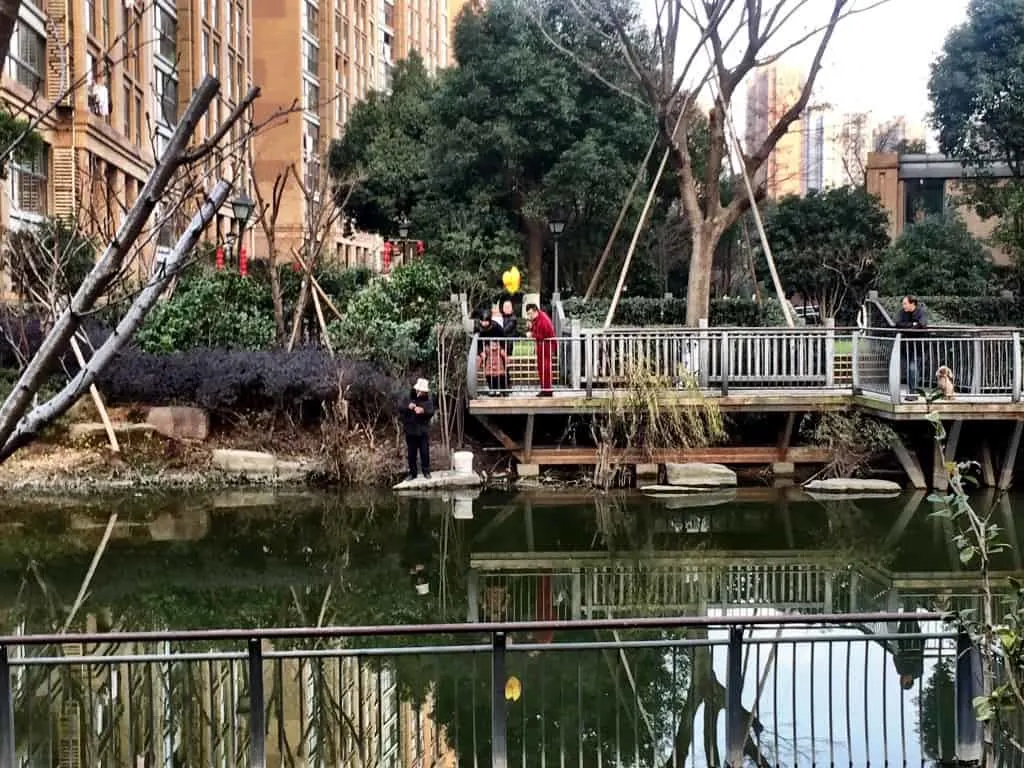
Fishing in Ningbo
The video below (click here if you’re reading in a reader) suggests that those members of the populace who are able will “vote with their feet” by moving away from polluted cities and out of China altogether:
Explaining China in terms of International Relationships
Explaining China in terms of its international relationships and impact leaves room for many different conclusions. There has long been a history of deliberate ambiguity, residual enigma or disingenuous obfuscation in communication on a macro basis.
One very serious issue in writing about the Chinese economy is that to understand what’s going on you often need to make inferences based on data out of Singapore, Hong Kong, Australia, or other places that enjoy strong economic links to China. The problem is that China’s authoritarian political system makes it very difficult to regard any of its economic data as reliable. . . What’s more, since the Chinese government clearly engages in censorship and information control to maintain its authority, there is no reason to believe it would be forthright about releasing bad economic news.” – Matthew Iglesias, Vox, China’s Economic Slowdown
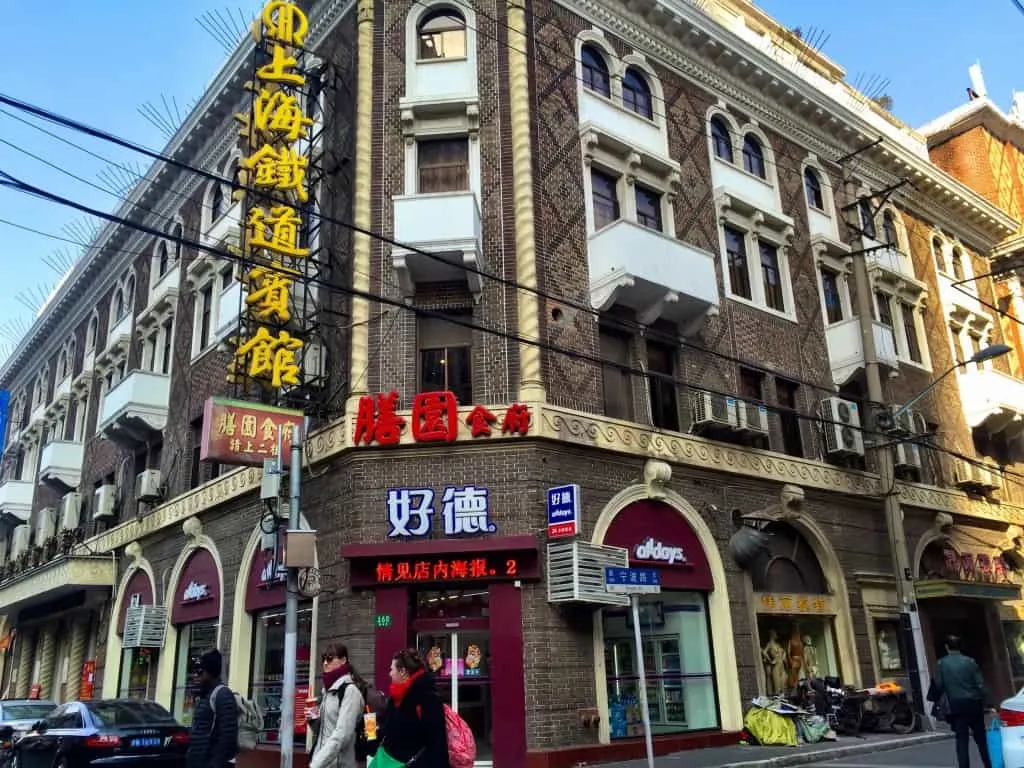
The Shanghai Railway Hotel, from where Chou En-Lai began the opposition to occupying Japanese in 1937.
Yet, if we are inclined to give official pronouncements any benefit (raised eyebrow), the future appears rather more promising.
Here I would like to briefly talk about China-US relations. China is an emerging power, but its rise is different from that of any other big powers. As China becomes the world’s second largest economy, many continue to render to the Thucydides Trap, believing that an emerging power is bound to challenge an established power. Hence war is inevitable. This is the doom scenario of power politics. Some even use the Anglo-German relations before World War 1 to describe the current China-US relations, believing there will be a war. History is not science, the so called ‘iron law’ does not exist. The purpose of recording history is to warn later generations from repeating previous mistakes. China and the United States agreed to build a new model of major-country relationship with ‘No conflict or confrontation’ as the prerequisite, ‘Mutual respect’ as the basic principle and ‘Win-win cooperation’ as the only way to turn the vision into a reality. This is not only in the benefits of China and USA, but also in the benefits of the whole world.” – Consul General Jin Zhijian’s “China’s Place in the World” speech, at the U3A Course, Dunedin, March 2016
China may well indeed have recognized that its domestic issues have the potential to be more threatening than external influences. Premier Li Keqiang has 10 million university and vocational school graduates who are flooding the job market. Reuters reports that already impressive GDP growth projections (6.2% in 2016 and 5.8% in 2017) have been increased, but the numbers are based on fiscal easing and inflated property investments. We know how well all that worked out in our part of the world.
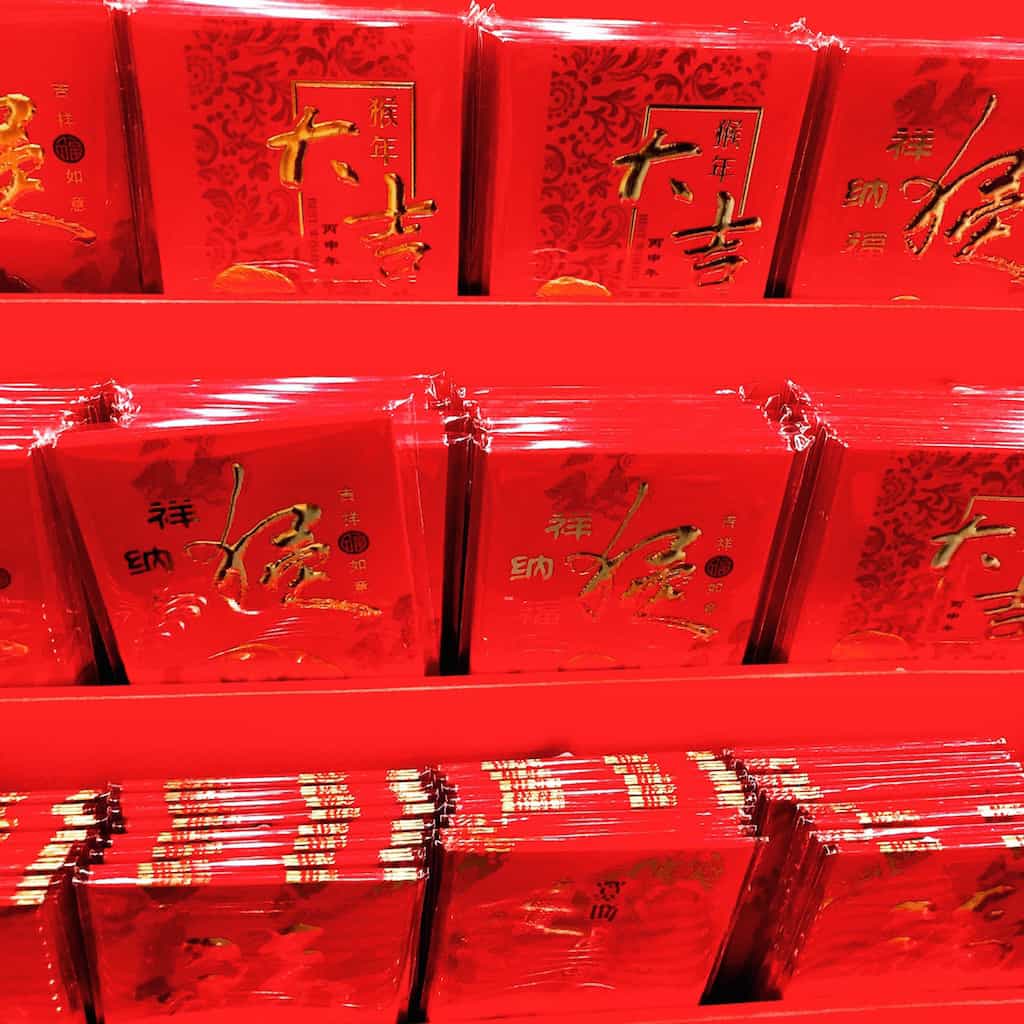
Traditional red New Year’s envelopes for gifts of money
Chinese money is increasingly being invested outside of China. Experts warn of major corrections in global economies which are Chinese asset heavy: real estate in Hong Kong and Singapore, M&A transactions in hospitality and energy (GE Appliances), technology (Opera and Ingram Micro), pesticides (Syngenta), finance (the Chicago Stock Exchange). China is expected to have to devalue its currency to service its debt, which exploded from $7 trillion in 2007 to over $30 trillion. This could cause investors to short. At the store, our paper bills were routinely examined for authenticity. Apparently there is widespread counterfeiting.
China remains a middle-income country with shaky economic institutions and an opaque and unaccountable political system. Three decades of stellar growth starting from a rock-bottom floor have landed China at a level of per capita prosperity that’s similar to Serbia or Peru or the Dominican Republic — places that nobody regards as obviously amazing investment opportunities even though in some ways their political systems are more solid than China’s.” – Matthew Iglesias, Vox, China’s Economic Slowdown
We think the best way of explaining China is that it is undergoing its Financial and Industrial Revolution, grappling with the same issues as other first world nations have in the past. The fact that it is doing so at this moment in history (as opposed to the 19th and 20th century) means expectations are different. Environmental pollution is the largest reason behind public protests in China today, and they’re growing at a rate of 29% per year.
It wasn’t that long ago, for example, that polluted rivers in the United States were catching fire, and dubious pockets of air quality still exist. Our population migrated from farms to urban areas in the last century. Even our own Environmental Protection Agency has been asleep at the wheel in Flint, Colorado and other places. But though we might be placing unfair expectations upon China, the global stakes are greater due to its sheer size.
In 2015, despite downward pressure at home and abroad, the Chinese economy still grew by 6.9%, leading the world and contributing to 25% of global growth. China has thus remained an indisputable main engine driving the world economy.” – Consul General Jin Zhijian’s “China’s Place in the World” speech, at the U3A Course, Dunedin, March 2016
With the second largest (or the first, depending upon whom you believe) economy in the world, China’s shaky financial ground ripples outward. A deflationary debt spiral with an unknown number of nonperforming loans, and a government plan to allow debt-equity swaps between corporations and banks could topple the house of cards. How flimsy it might be is anyone’s guess. Globally, in what Bloomberg calls a “soft-power victory for China over the U.S.,” the Asian Infrastructure Investment Bank (AIIB) represents China’s aspirations to play a multilateral capitalization role, bypassing the United States and Japan in favor of European partners.
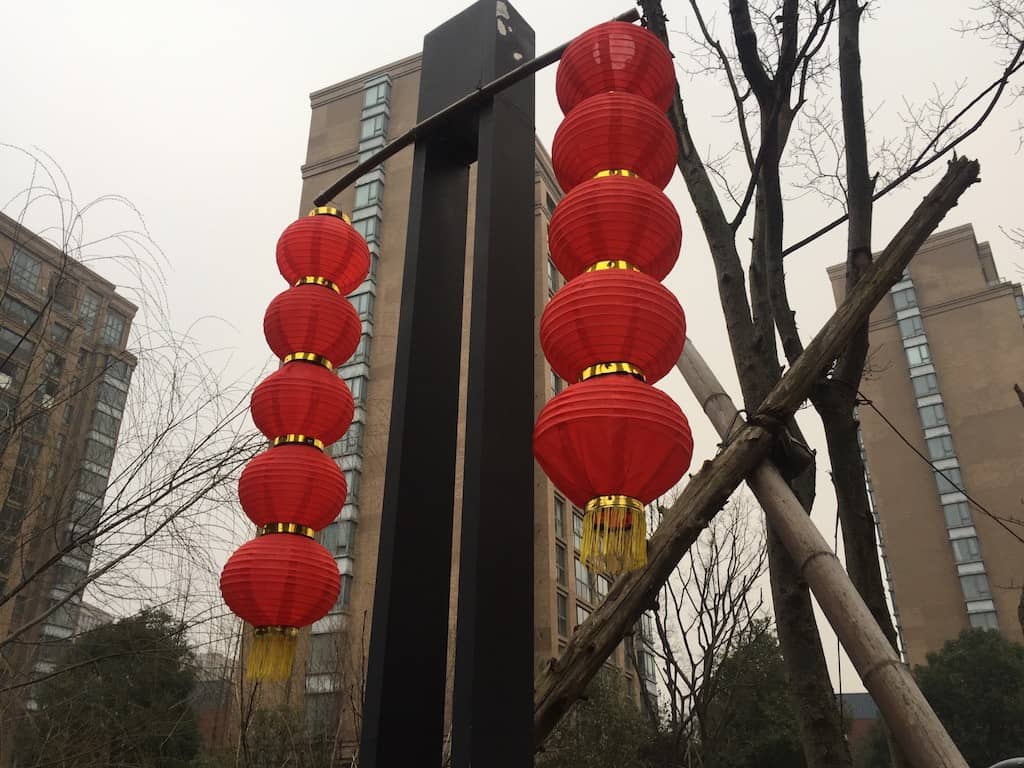
Paper lanterns in our complex
What does all this mean to the traveler? Explaining China in a practical context to visitors who are interested in seeing historical and cultural sights, partaking of nightlife and entertainment in the cities, and who feel more at ease with branded hotels and retail experiences, is simple. It’s easier than ever before to obtain a Chinese visa and plan a relatively independent stay. That said, depending upon what you think your adaptability to a big culture shock will be, you may want to consider a more organized approach by way of a reputable tour.
If you are interested in an experience which takes you away from the main cities into a more rural or remote atmosphere, your opportunities to do so may be affected by the urbanization programs in the future. Consider accelerating your plans. If you are a highly independent sort, you will find China a challenge, but it needn’t be overly so. Do your homework ahead of time and know yourself well, because you’ll be tested.
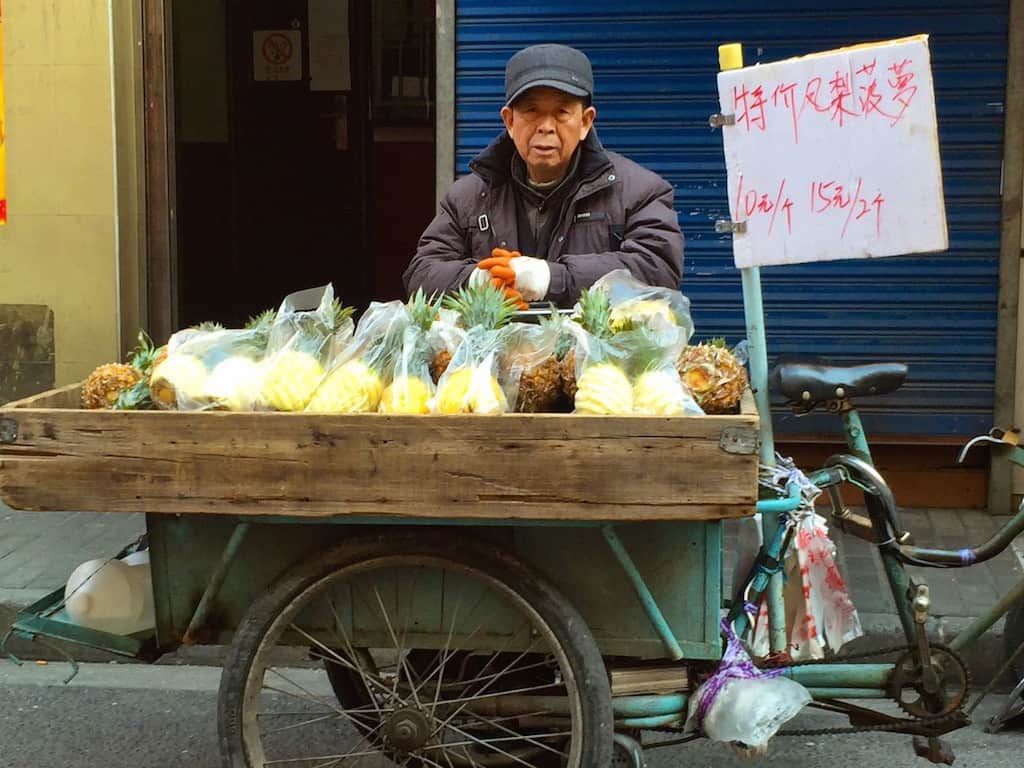
Beautiful spiral-cut pineapples on the back of a bicycle in Shanghai
We’re happy we had the opportunity to visit China. Pete had previously visited several cities as a college student back in 1978, and as you can imagine, explaining China compared with then is like talking about an entirely different country. While we may not have had a typical visitor experience, we’re also happy that we had the benefit of a daily life immersion by virtue of a house sit. Next time, we hope to visit other locations where tourists are less likely to go, as well.
And our friend? After explaining China as we understood it from our brief stay, we advised her to jump at the chance.
Tips and Practicalities:
If you want to stay connected (social media like Facebook and Twitter, and all things Google – like your Gmail?) while in China, you’re going to need a VPN. Click here for a description of what that is. Don’t worry about using a VPN while you’re in China. All the best people do, bahahaha. We recommend ExpressVPN (affiliate link).
Getting around by train is easy. In the Shanghai train station, there are even separate windows for foreign passengers to purchase tickets, and there are English-speakers in uniform at the help desks. From Shanghai’s airport, board the Maglev train to Longyang Road and continue on the same line to Hongqiao Railway Station for out-of-town trains.
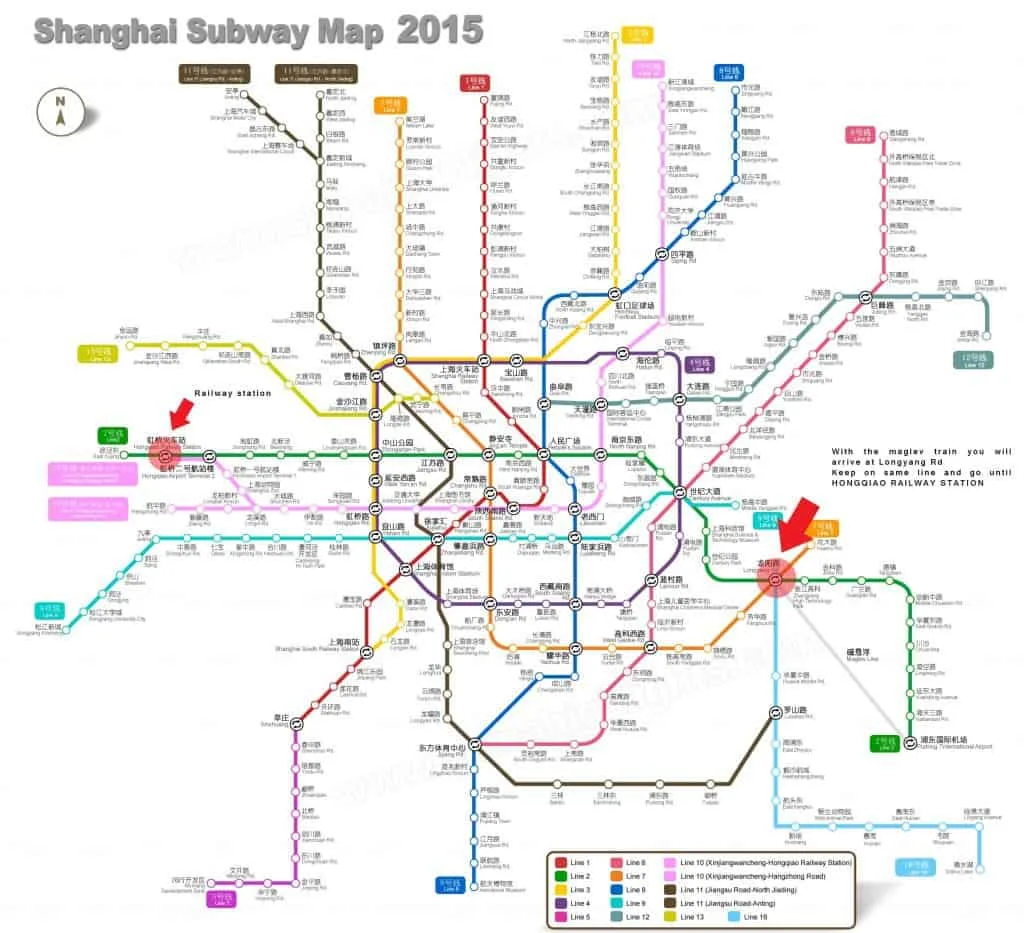
We booked our Shanghai hotel, the Howard Johnson Plaza Shanghai using Wyndham Rewards points. This is a luxurious, centrally-located base within a block of Nanjing Road, Shanghai’s pedestrian main street, and about ten minutes on foot from the popular riverside Bund district.
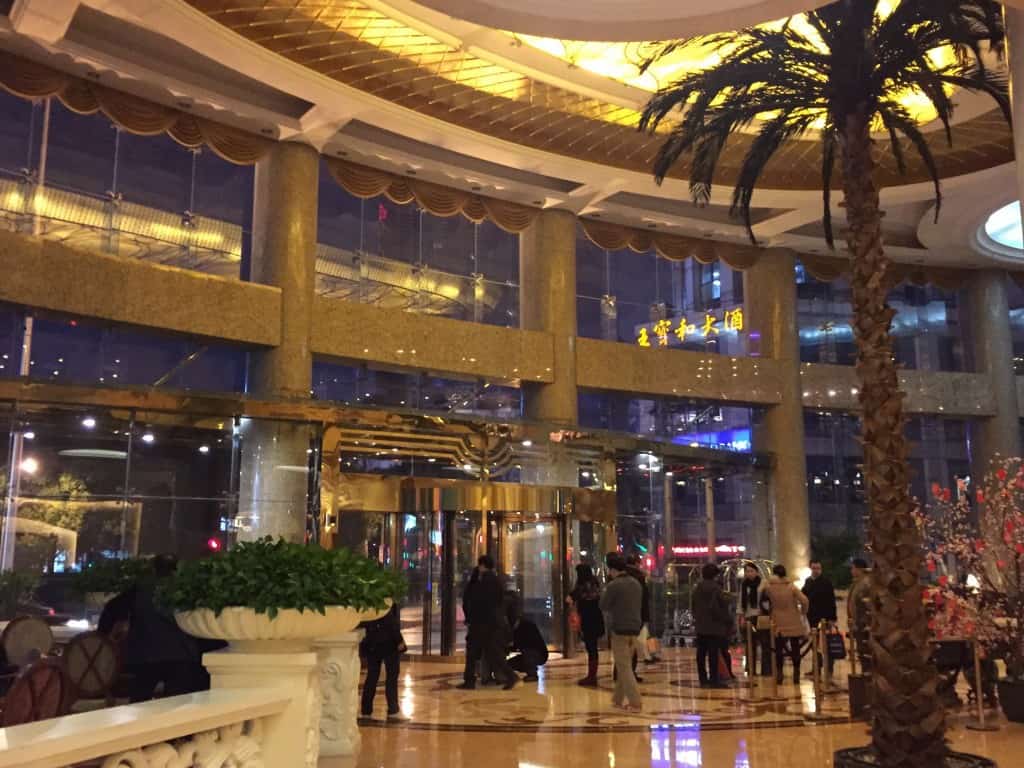
Howard Johnson Plaza Shanghai lobby
If you are interested in additional reading about China, we recommend Life and Death in Shanghai, and Wild Swans: Three Daughters of China.
Pinnable Images:
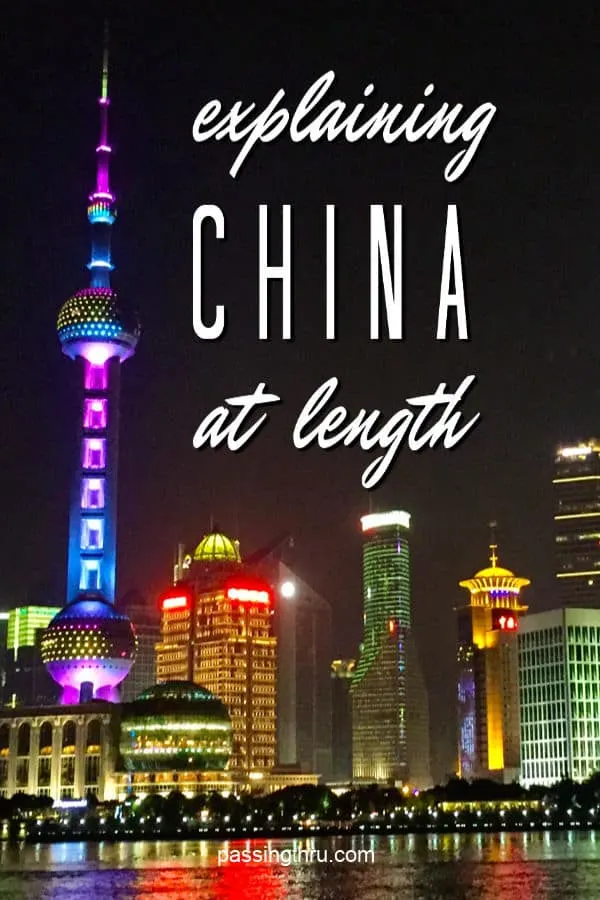
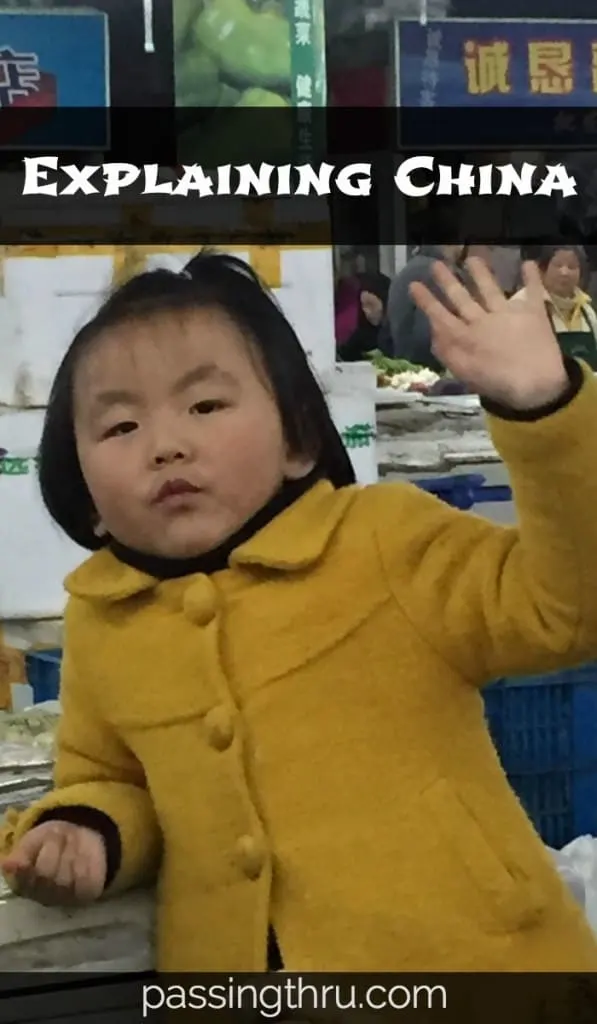
Tips for Trip Success
Book Your Flight
Find an inexpensive flight by using Kayak, a favorite of ours because it regularly returns less expensive flight options from a variety of airlines.
Book Your Hotel or Special Accommodation
We are big fans of Booking.com. We like their review system and photos. If we want to see more reviews and additional booking options, we go to Expedia.
You Need Travel Insurance!
Good travel insurance means having total peace of mind. Travel insurance protects you when your medical insurance often will not and better than what you get from your credit card. It will provide comprehensive coverage should you need medical treatment or return to the United States, compensation for trip interruption, baggage loss, and other situations.Find the Perfect Insurance Plan for Your Trip
PassingThru is a participant in the Amazon Services LLC Associates Program. As an Amazon Associate I earn from qualifying purchases.
To view PassingThru’s privacy policy, click here.

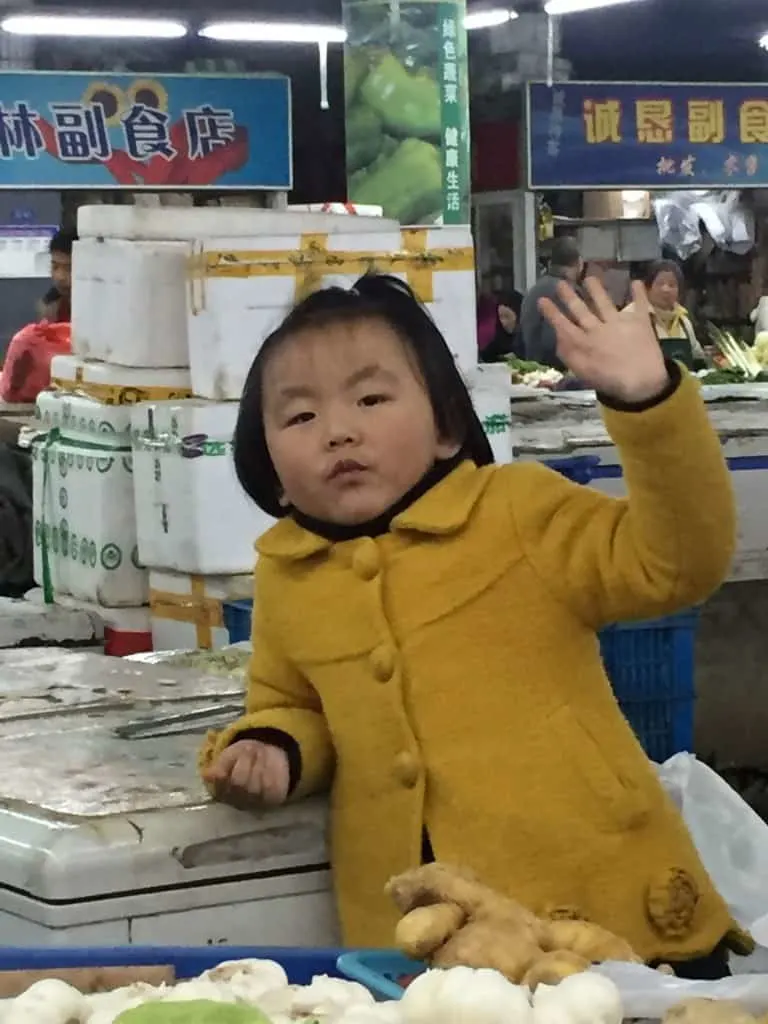
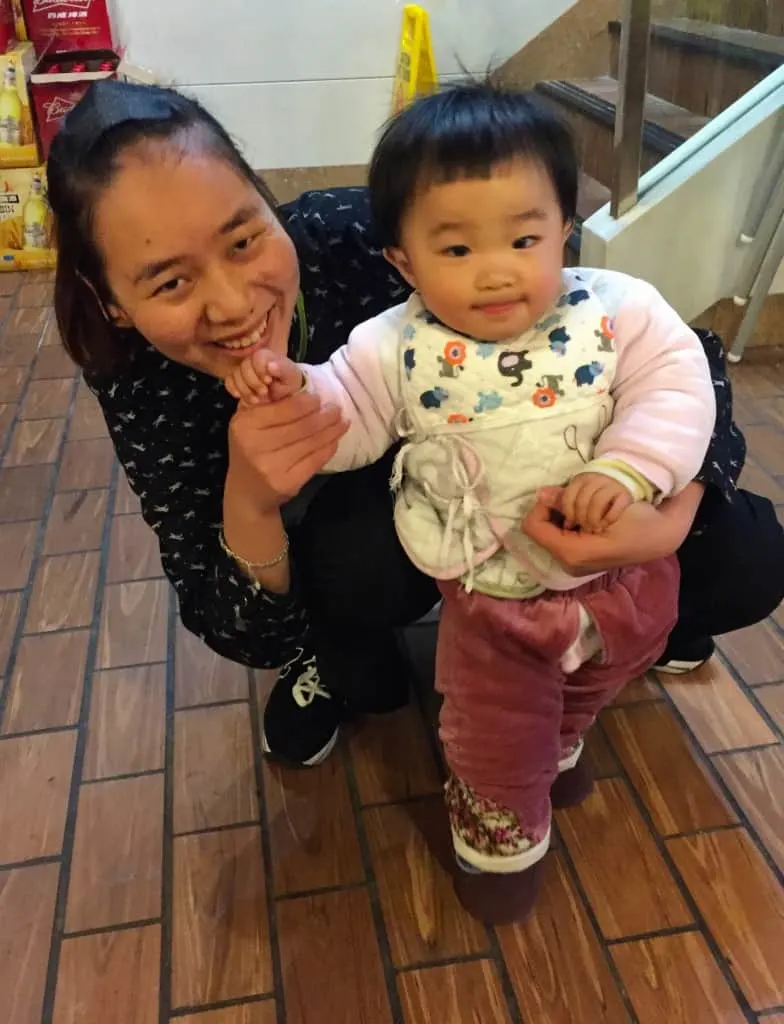
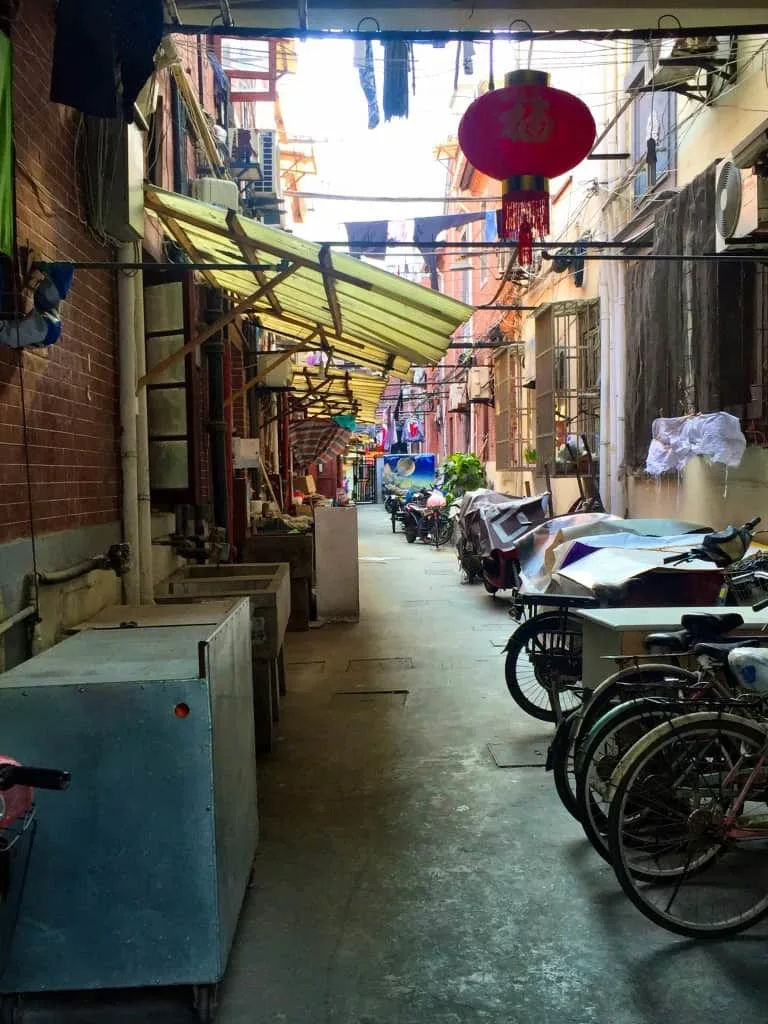
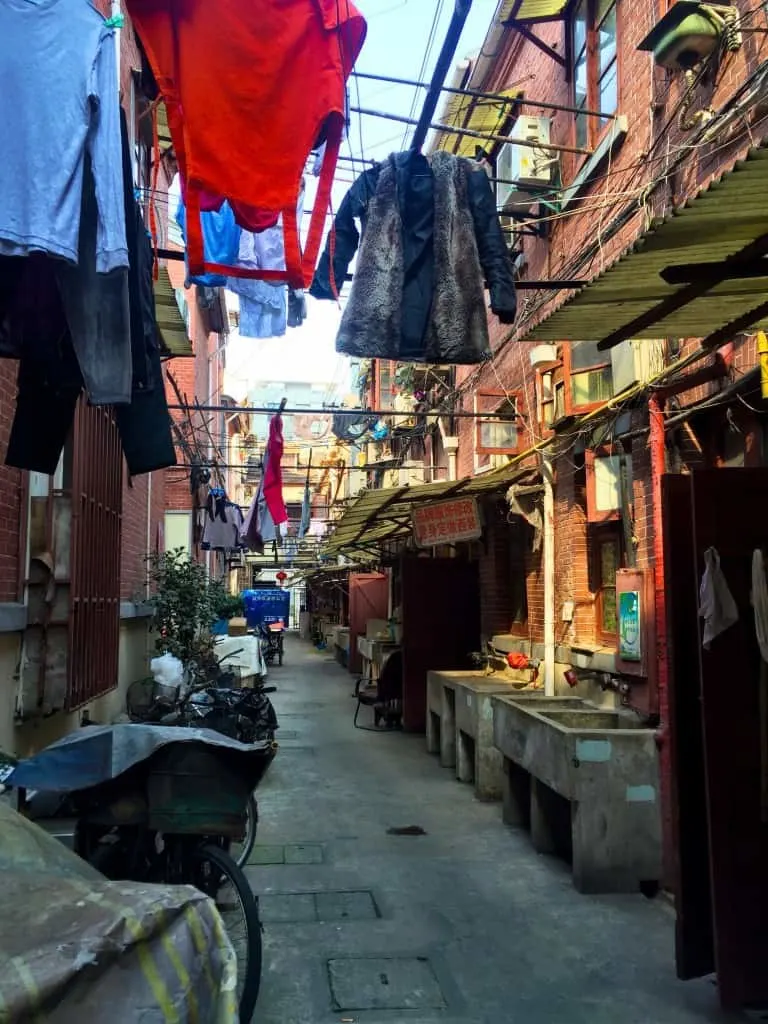
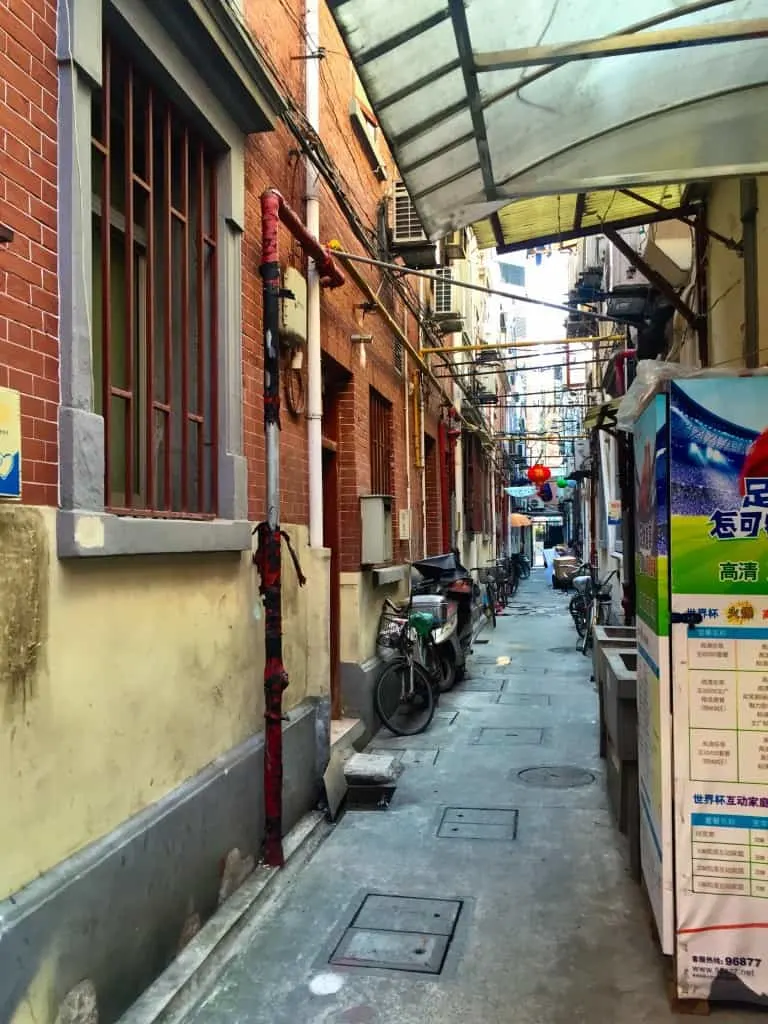
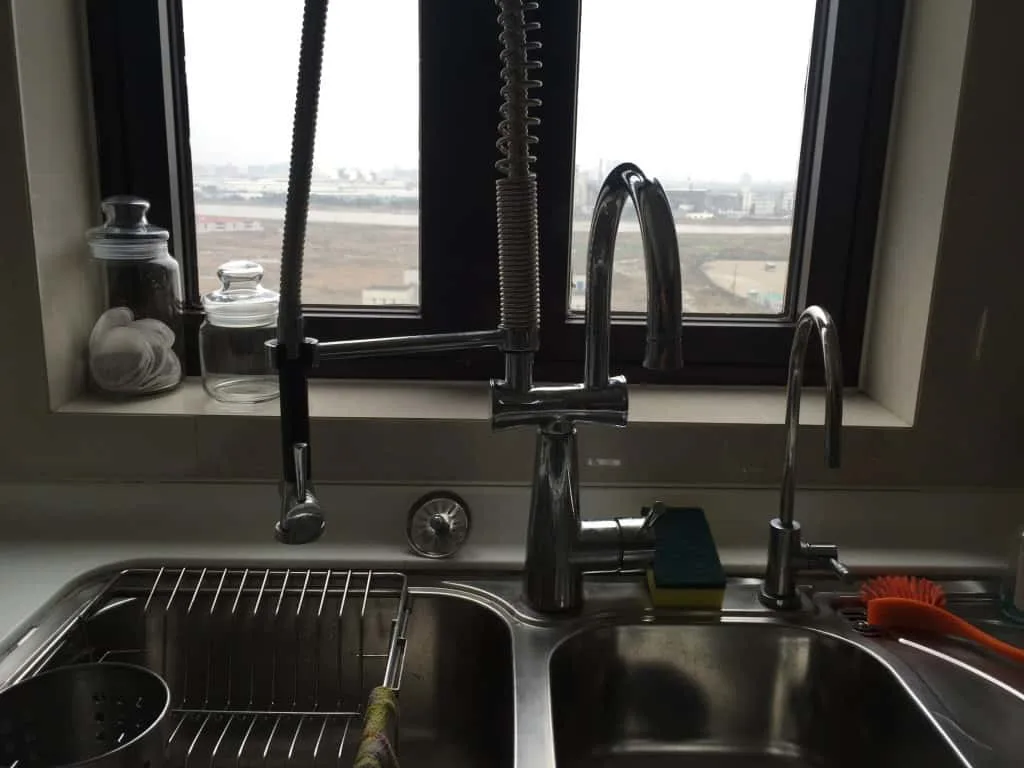


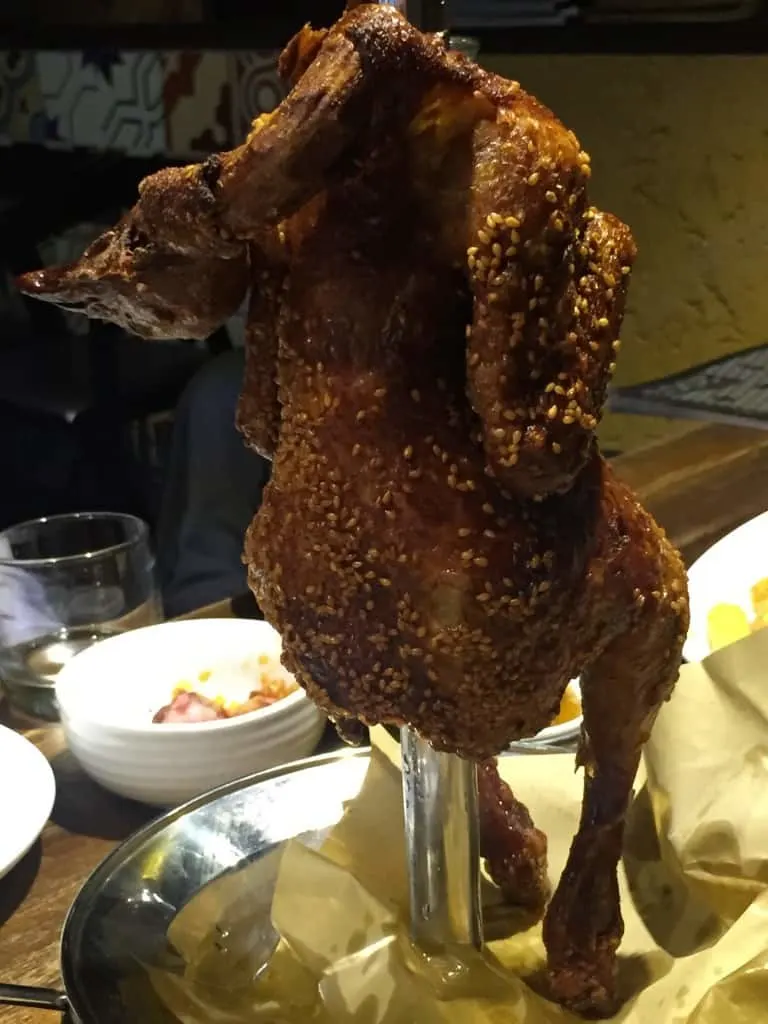
Peter
Sunday 31st of March 2019
Interesting post. China has its ups and downs like all countries I have visited or stayed in for an extended length of time. Great travel writers inspire and share their experiences good and bad but find a balance with the genuine interest of trying to encourage people to travel and experience things for themselves. One person's experience does not mean others will experience the same good or bad. Those expert travel writers who inspired me to travel always had a knack of saying a negative but adding the positive. I always see myself as a guest in any country I go to. I have respect for any country, its culture, politics, religion or its diverse groups of people. This is what I would expect from visitors to my country. If I don't like a country there are many doors to leave. Better still if people are so arrogant they should stay home. Enjoy life, enjoy travel, find the good in everything you see and do.
touran
Monday 8th of October 2018
For me NordVPN worked quite fine in China if I remember it correctly :) It's the first VPN provider I tried, but I don't think I need to search for a better one, I like it as I never had any issues with the product itself :)
Kavleen Kaur
Tuesday 2nd of October 2018
nice pictures!!!!
Sue Reddel
Friday 15th of April 2016
I had to save this post for a time I could really appreciate it and it was worth the wait. Your experience and research are spot on. We've been to Beijing several times. One time the pollution was so bad the air has a red tint. Really bad air quality. I'm guessing the respitory problems there will get worse and worse. Great work Betsy!
Betsy Wuebker
Monday 18th of April 2016
Hi Sue - Thank you so much. I haven't been sure whether I even want to go to Beijing because of the pollution, but I think I do, if only for several days. I also want to visit less popular places in China. Thanks!
Karen Warren
Wednesday 13th of April 2016
Very interesting. The culture of China is very different to what we are used to in the west. However the size of the population and the growing economy mean that it will assume greater importance in the world so we need to try to understand it. Thanks for this comprehensive introduction.
Betsy Wuebker
Thursday 14th of April 2016
Hi Karen - So true! We do need to understand and the best way is to see first hand, but as travelers, we often preach to the choir. :)